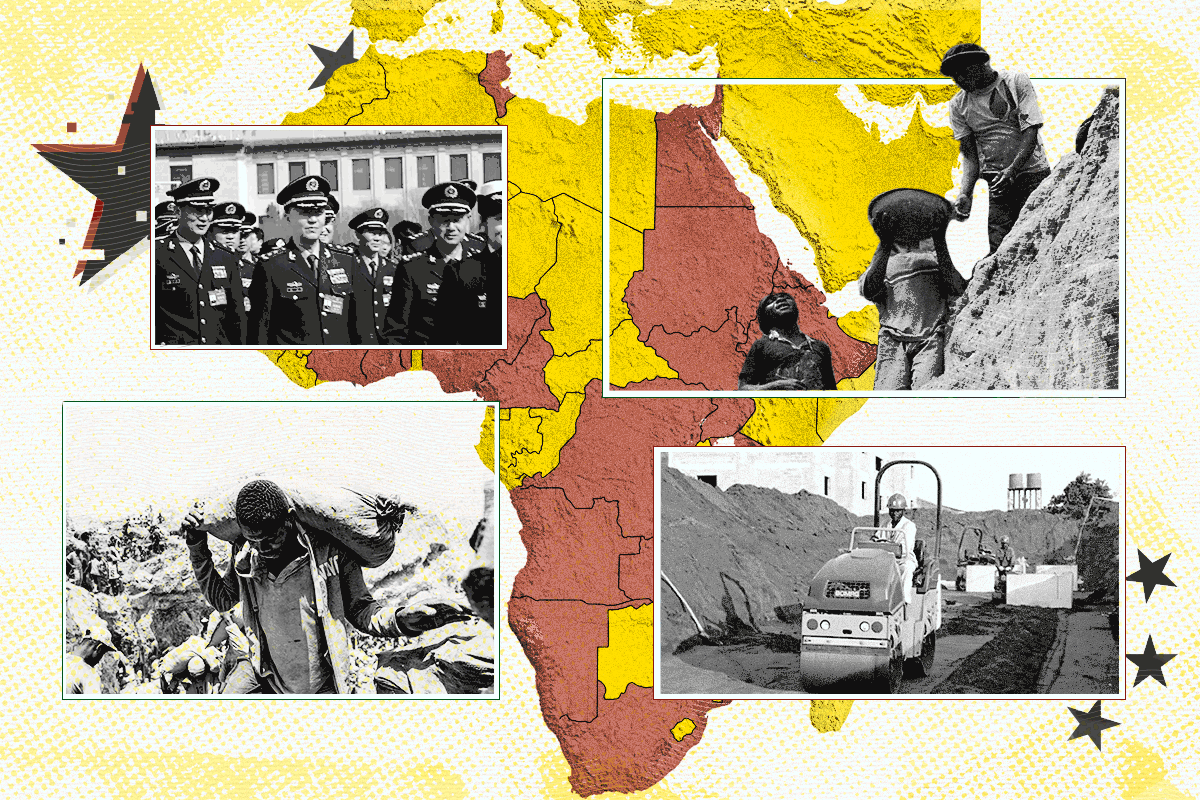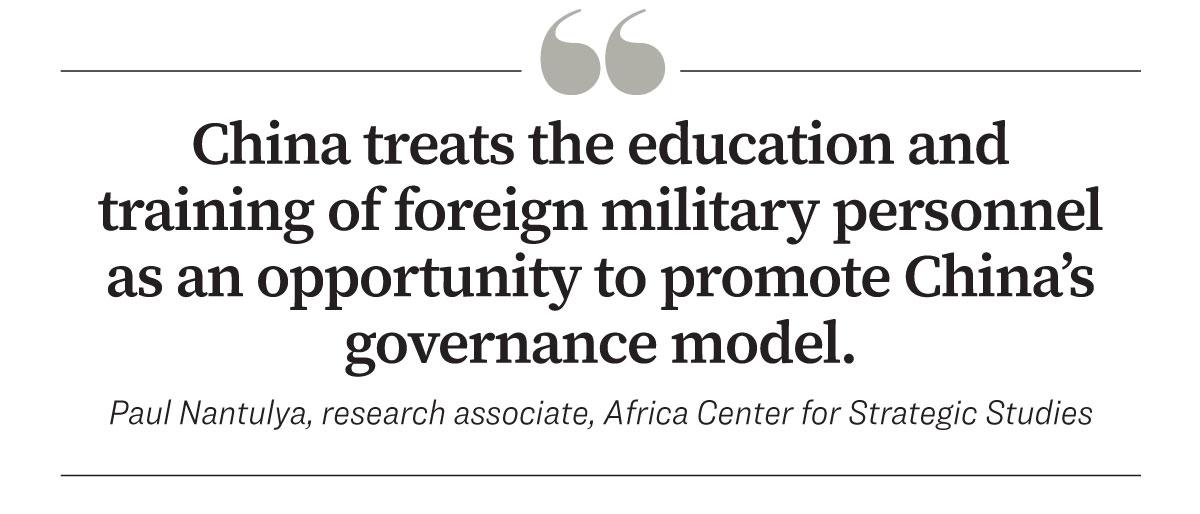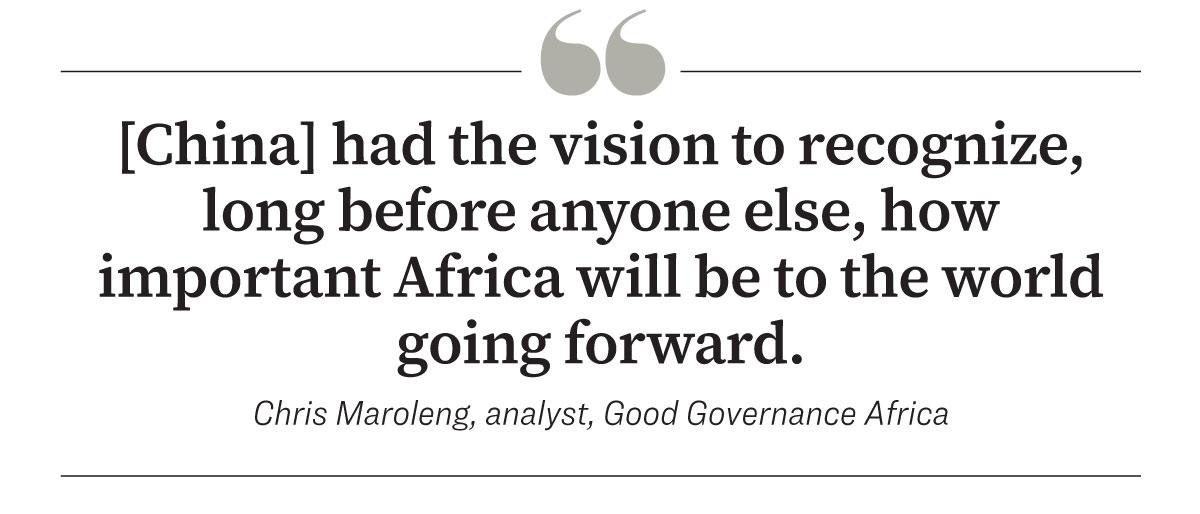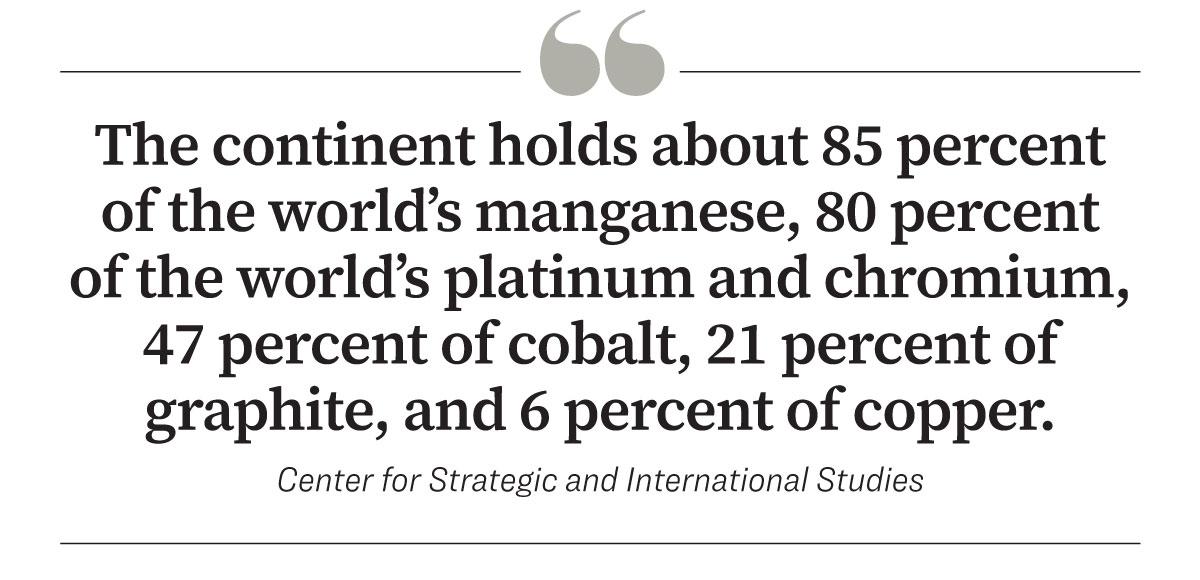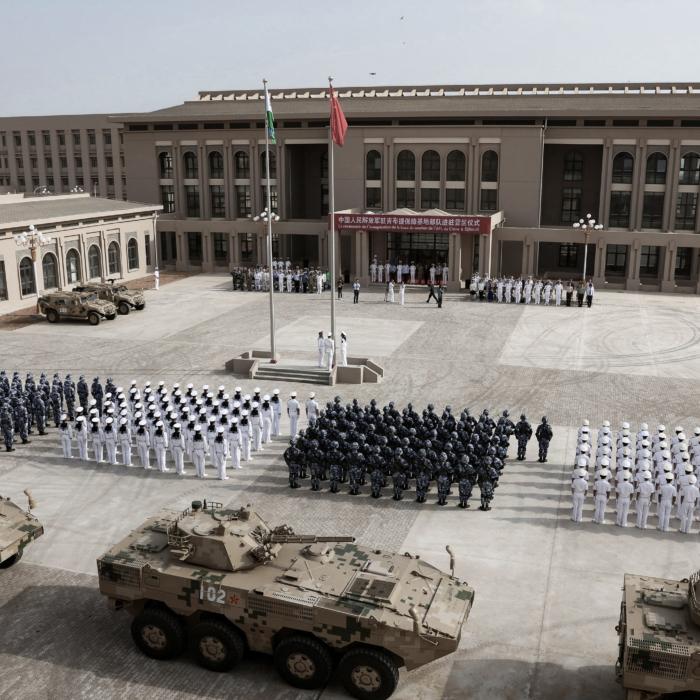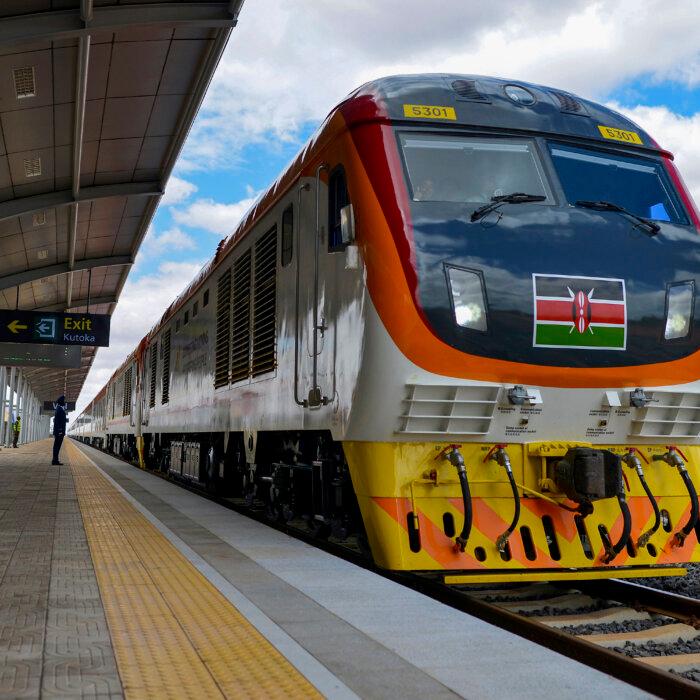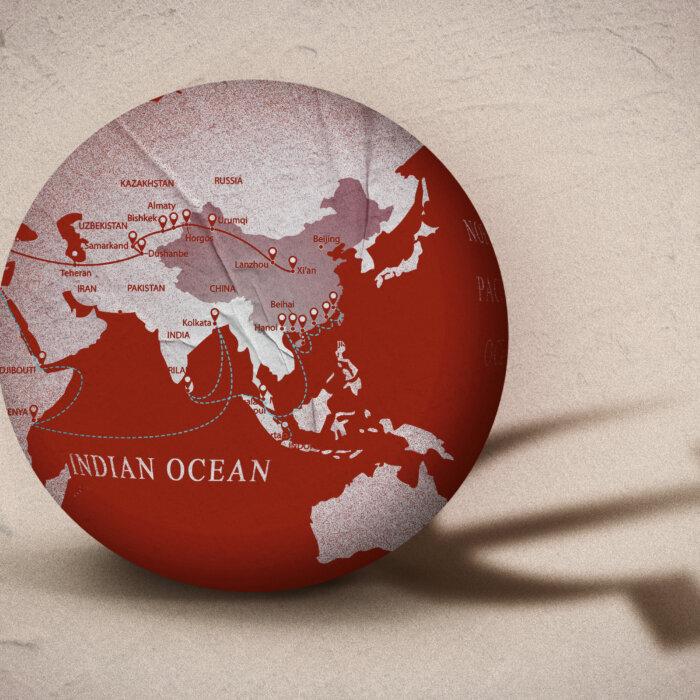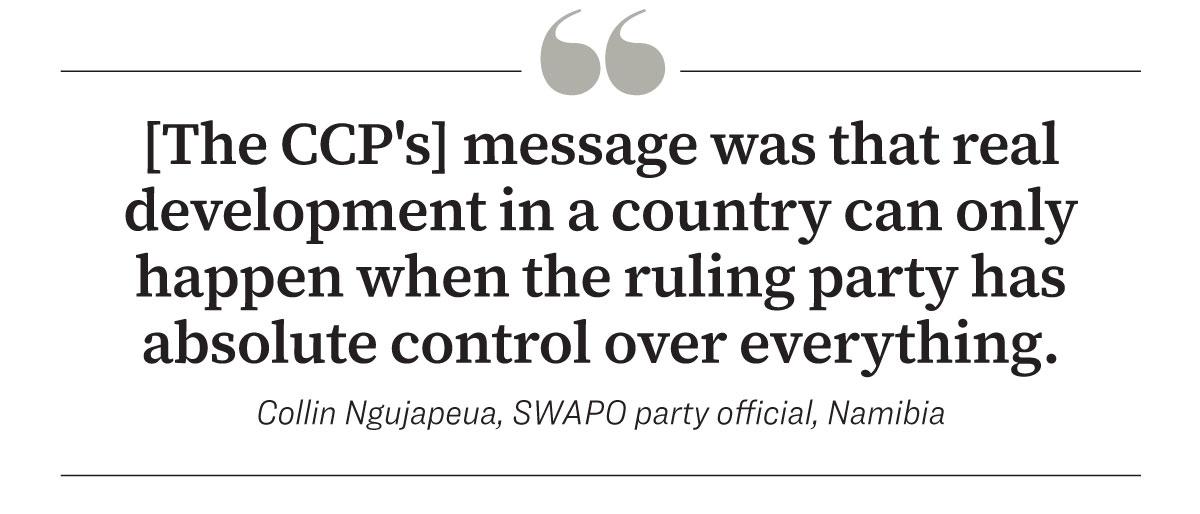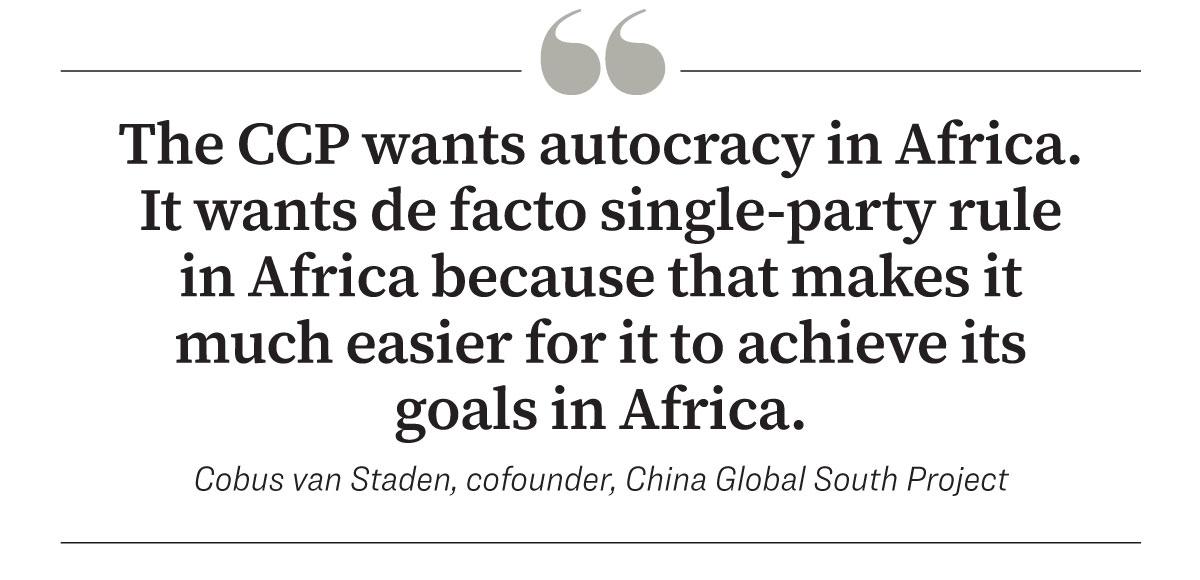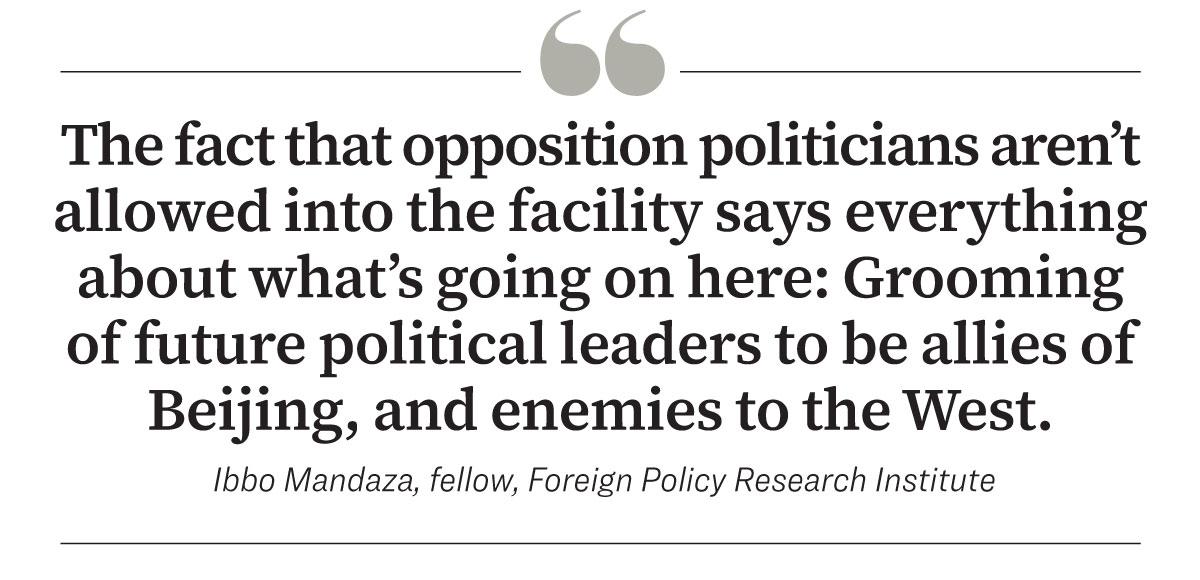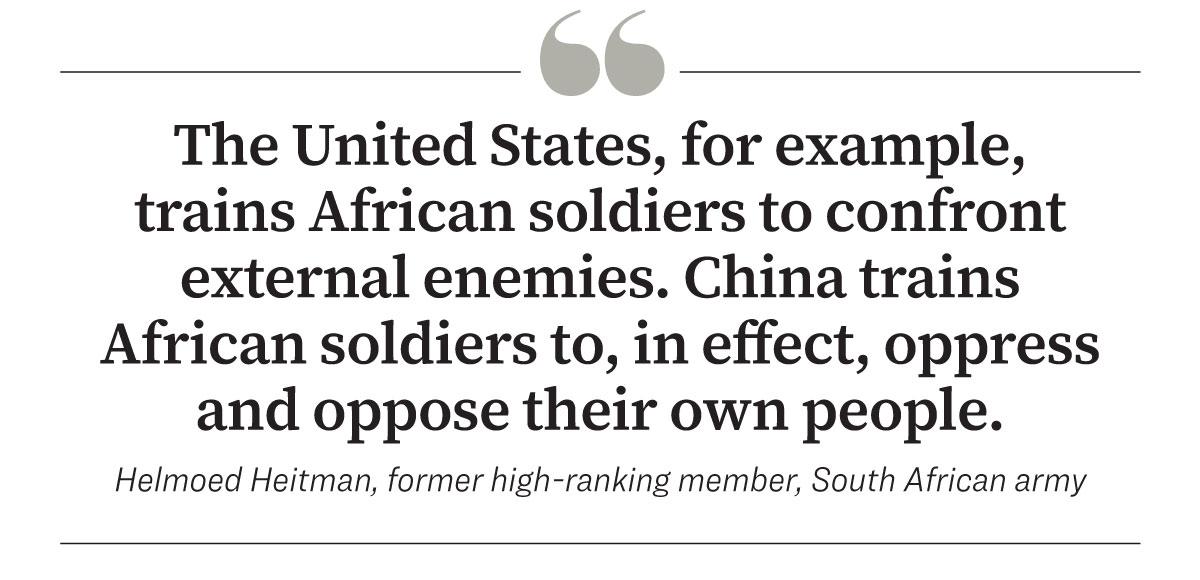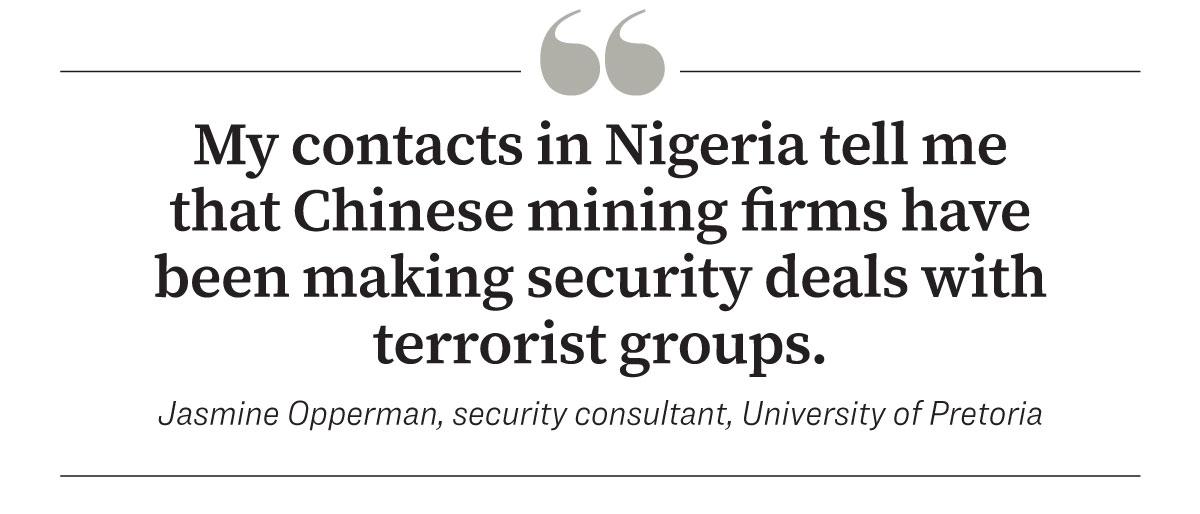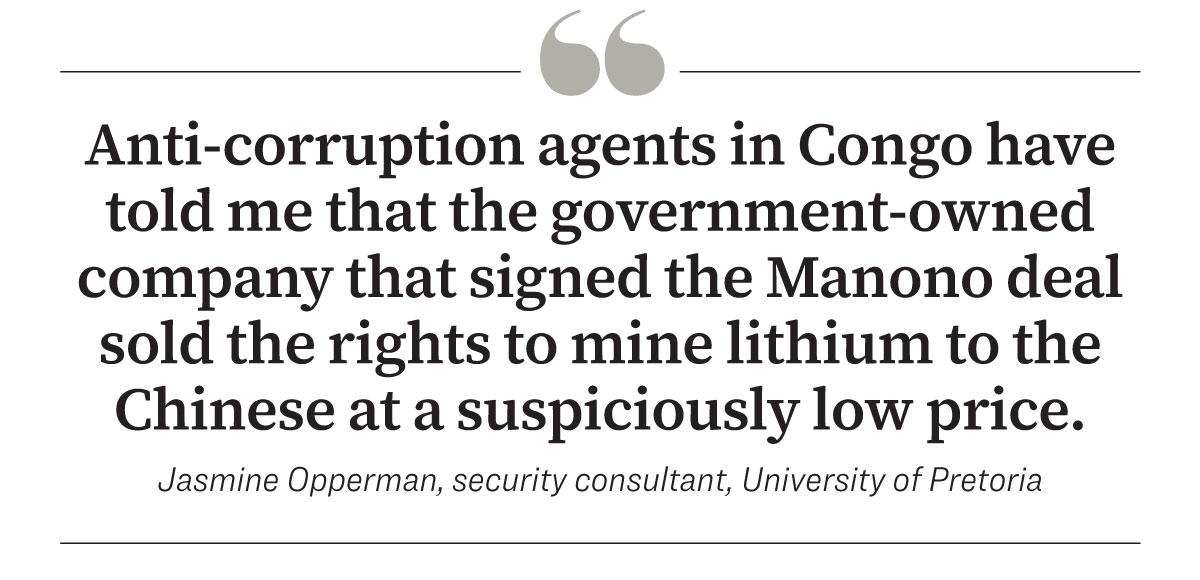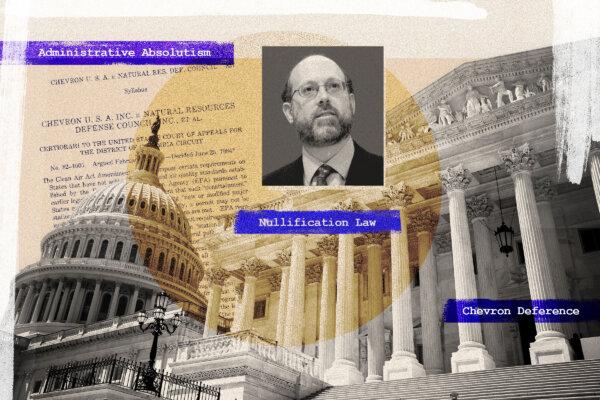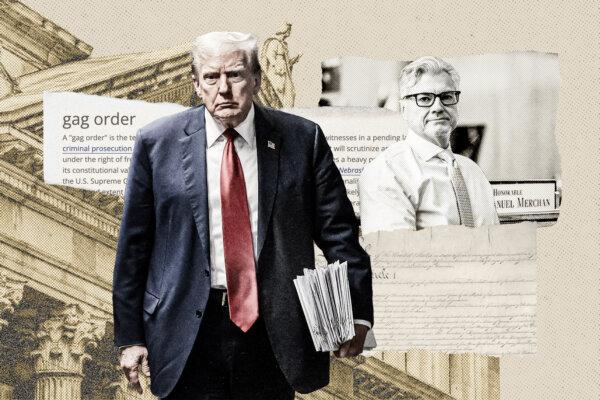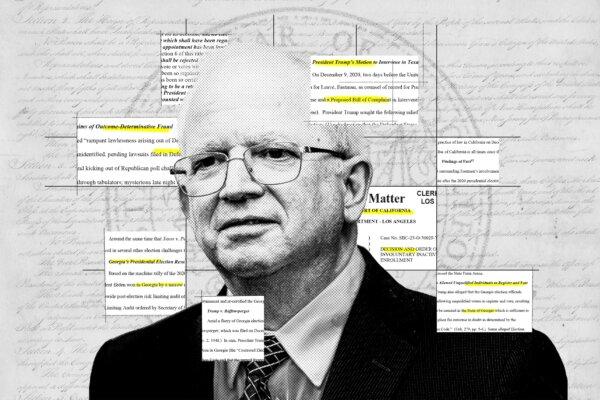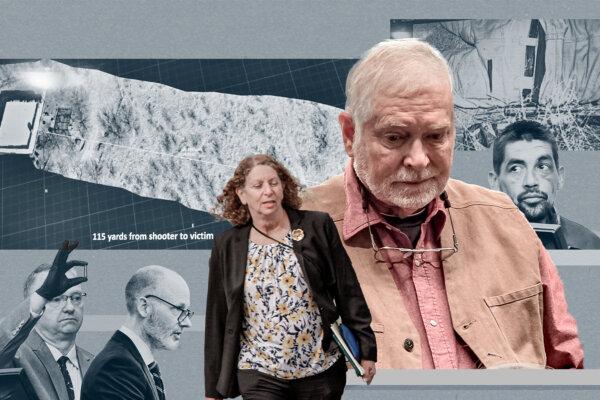JOHANNESBURG—China’s influence in and over the lives of Africa’s 1.5 billion people is now so broad that it extends into almost all aspects of African societies.
The communist regime’s footprint is stamped across the continent in almost all economic sectors, including agriculture, natural resources, and trade and logistics. Chinese companies are deeply invested in manufacturing, services, and real estate.
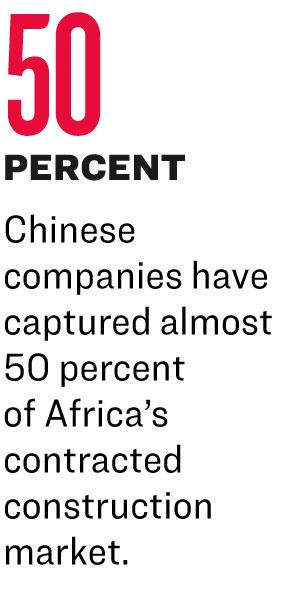
The Chinese Communist Party (CCP) began cementing ties with Africa in the 1950s, by supplying the continent’s liberation movements with arms, money, and military and “political education.”
It has used this history as a basis from which to launch itself into the economies of modern-day Africa. Many of today’s African leaders either trained in China, or their fathers did so.
China’s desire to extract minerals often compels it to cement ties with Africa’s authoritarian regimes. In Zimbabwe, where the ZANU-PF government is accused of corruption and killing its opponents, China owns many of the country’s precious metals and minerals mines.
The CCP is also establishing itself as a significant military presence in Africa, holding regular training exercises with continental armies and navies.
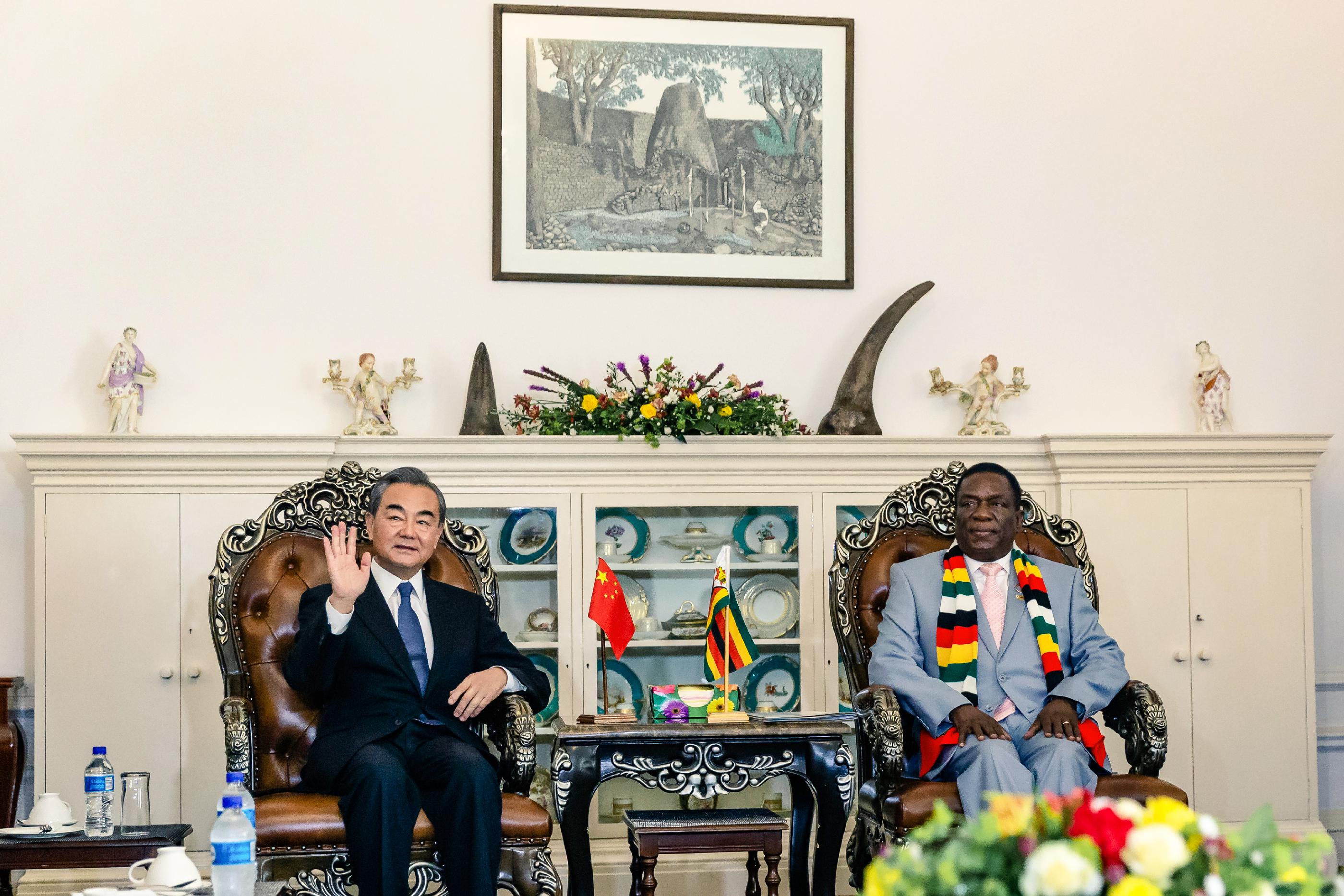
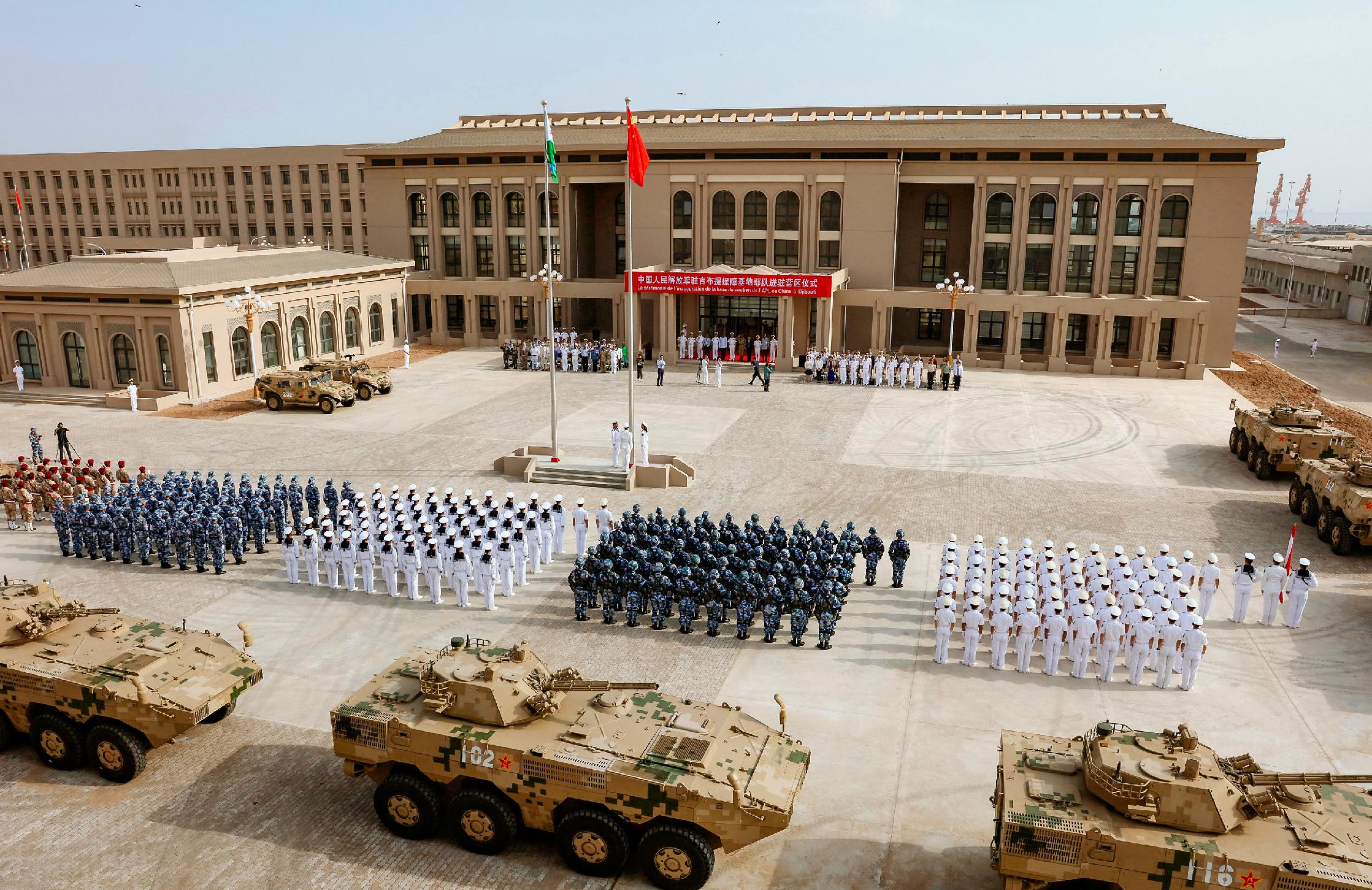
In August 2023, the 96th anniversary of the founding of the Chinese People’s Liberation Army (PLA) was celebrated in almost every African nation.
China has established 61 Confucius Institutes in 46 African countries, education centers designed to counter Western ideals of democracy and to promote Chinese culture and language in Africa.
Beijing has built a “Leadership School” in Tanzania, where party officials instruct African leaders on anti-democratic ways of governance.
“China treats the education and training of foreign military personnel as an opportunity to promote China’s governance model to develop closer relationships with foreign militaries and governments and to build a shared understanding of security,” Paul Nantulya, research associate at the Africa Center for Strategic Studies, told The Epoch Times.
“Many alumni of these programs go on to play leading roles in their countries’ militaries and governments. Thousands of African officers attend such trainings every year.”
Xi Jinping’s regime is encouraging some of Africa’s leading economies, including South Africa, Nigeria, and Ethiopia, to “de-dollarize;” to wean themselves off the United States dollar as a trade currency and to begin using Chinese currency.
China’s massive infrastructure projects in Africa over the past two decades, through its Belt-and-Road Initiative (BRI), have helped it access the rare-earth minerals that have driven its economic growth.
China began pouring investments into Africa in 2013 when Xi unveiled the BRI.
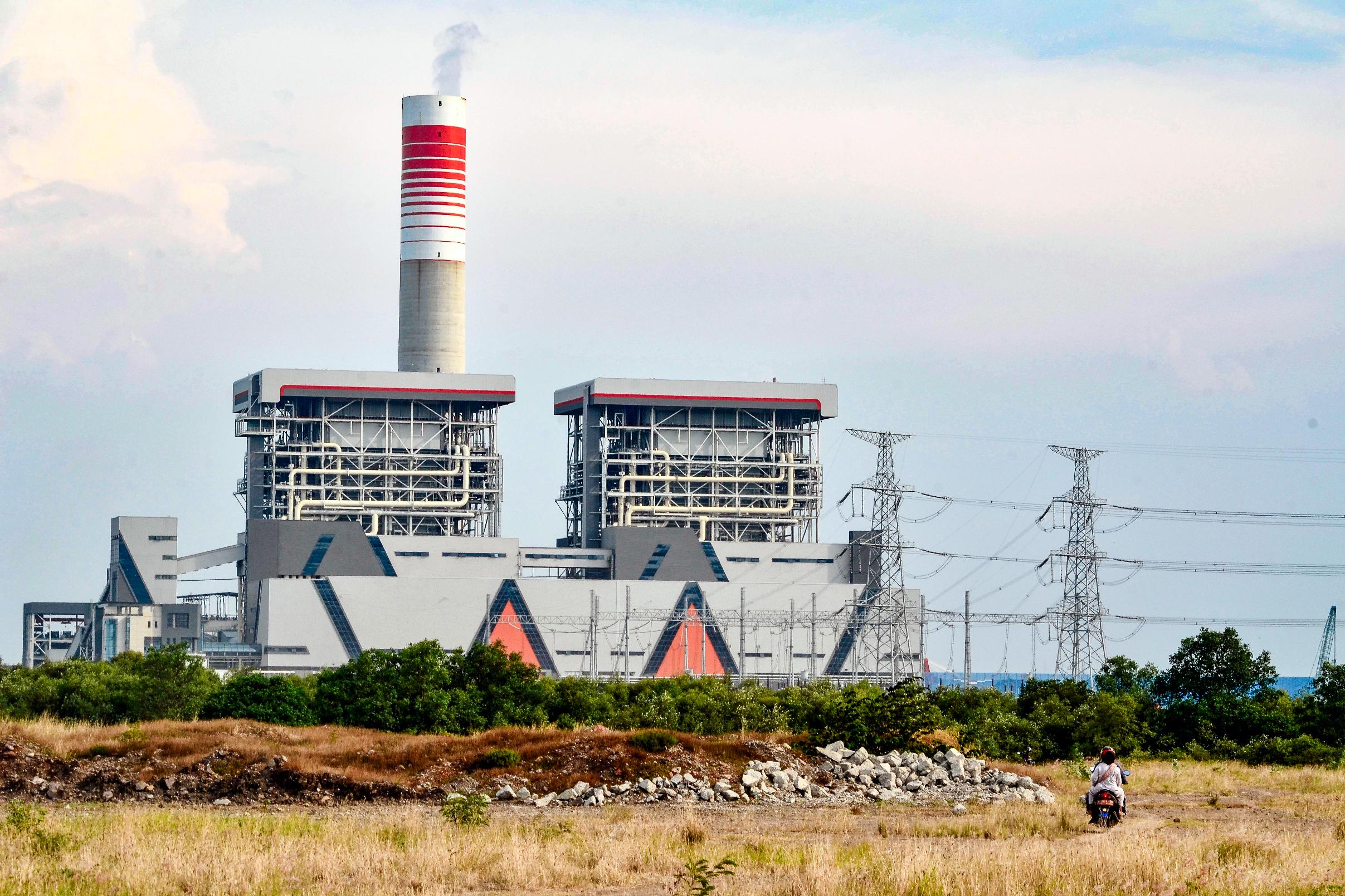
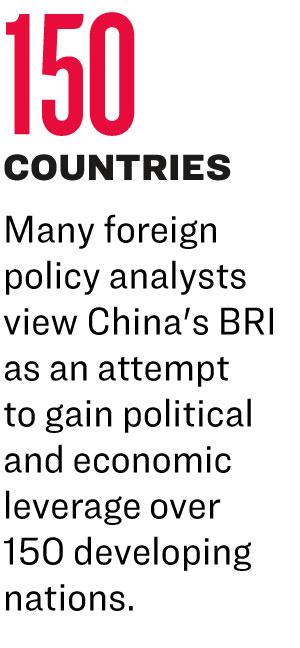
However, many foreign policy analysts view the BRI as China’s attempt to gain political and economic leverage over 150 developing nations, many in Africa, and access to wealth and resources.
China has made big investments in Africa’s mining and mineral extraction industries, especially in countries like the Democratic Republic of Congo (DRC), Ghana, Namibia, Nigeria, South Africa, and Zambia.
Chris Maroleng, international affairs analyst at Good Governance Africa, a non-profit in Johannesburg, said China’s greatest success so far in Africa was establishing itself as a “mining giant” on the continent, and securing access to metals and minerals that would be increasingly critical in the future.
“No matter what you say about China, and all its human rights abuses and the repressive ways of the CCP, it, and it alone, had the vision to recognize, long before anyone else, how important Africa will be to the world going forward,” Mr. Maroleng told the Epoch Times.
The United States’ work in Africa has largely been focused on AIDS relief and anti-terrorism, Mr. Maroleng said. While Africans were grateful for this, they were “more grateful for the respect” shown to them by the Chinese.
“Beijing saw African countries and of course those countries’ ruling elites, as true development partners,” Mr Maroleng said.
“While the United States and other Western nations were preaching democracy and human rights, Beijing was saying: ‘We want to partner with you and we want you to sell your minerals to us and we don’t care how you run your countries; that’s none of our business.’”
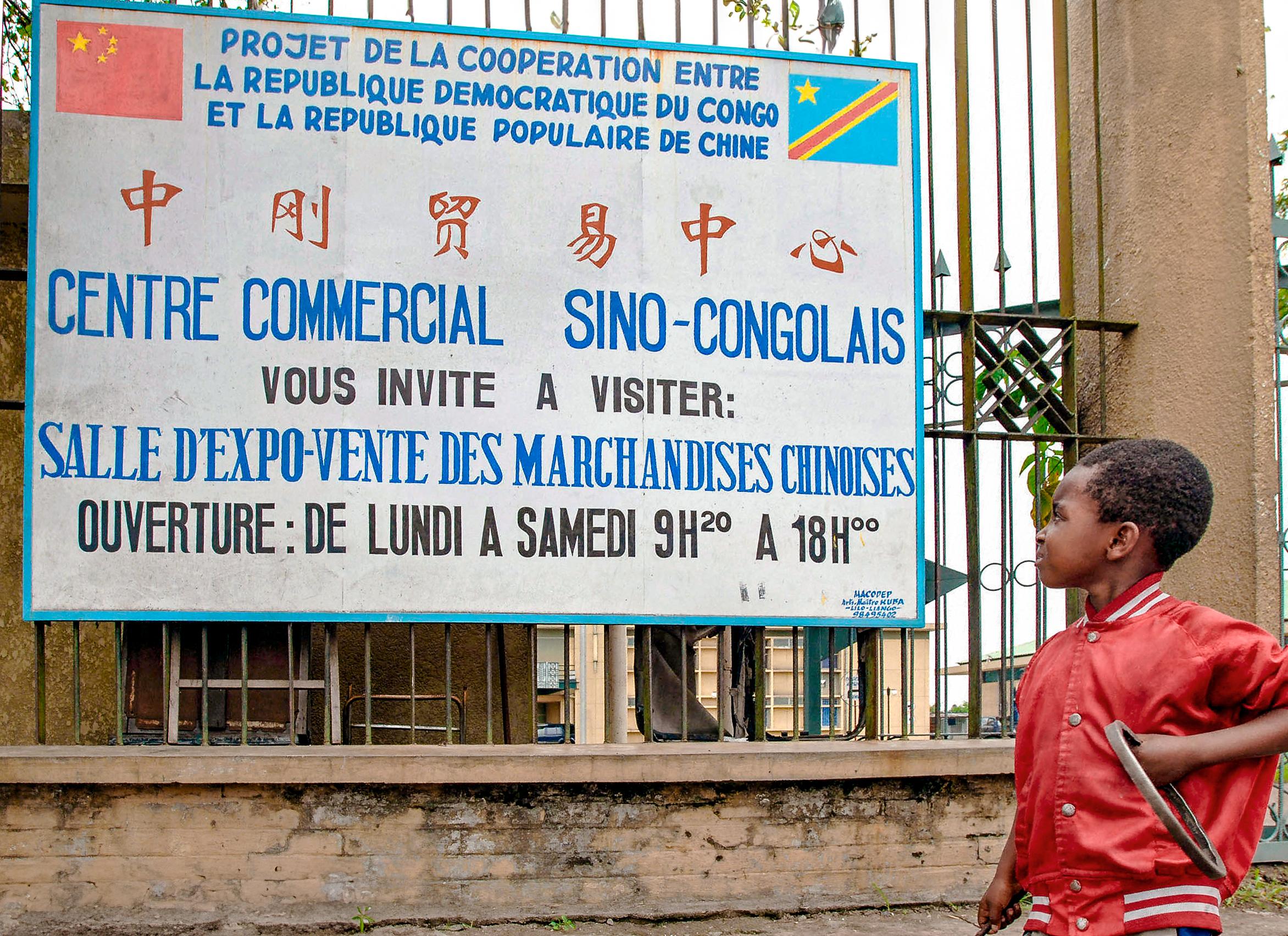
China’s Quest for Minerals
Unlike Western companies, China has invested in Africa’s metals and minerals industries despite the political instability, conflict, and corruption that’s pervasive across much of the continent.From the mid-2000s until about five years ago, many multinational mining companies sold their interests in Africa to China.
In 2016, for example, several American companies failed to maintain their cobalt mines in the DRC. China moved fast to snap them up, to further increase its presence in one of the world’s most mineral-rich regions.
The ball began rolling when U.S. firm Freeport-McMoRan accepted $2.65 billion from China Molybdenum for a controlling stake in Tenke Fungurume, a massive copper-and-cobalt mine near Kolwezi, southern DRC.
China Molybdenum bought another stake for $1.14 billion in 2019. This meant the U.S.’s biggest geopolitical enemy has exerted almost total control of one of the globe’s most important strategic minerals.
The leading use of cobalt is in rechargeable battery electrodes, and the metal is indispensable to the manufacture of electric vehicle batteries.
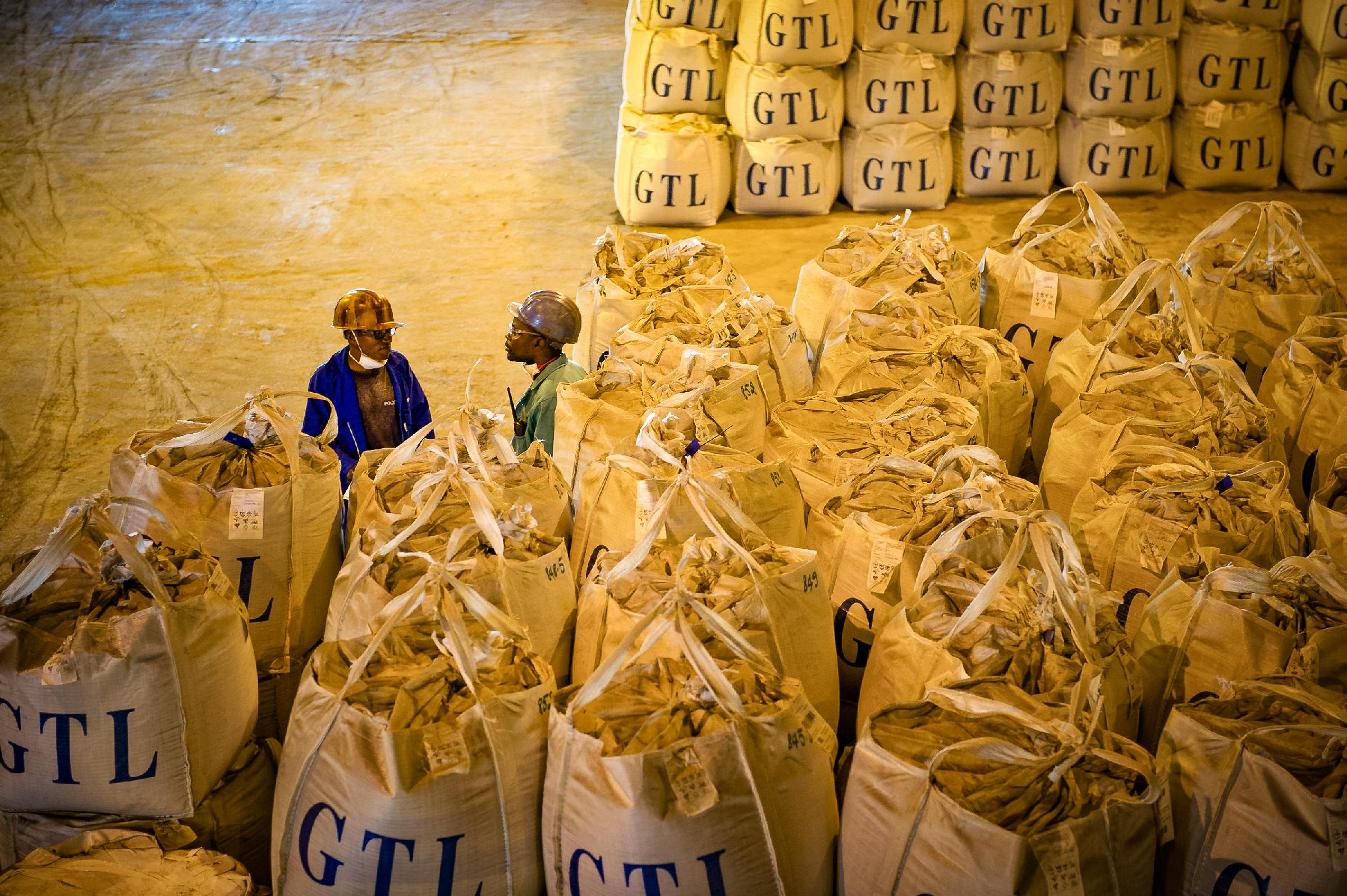
Cobalt has also become essential in the manufacture of computers and cellphones.
The USGS says it’s also used in “superalloys” and “high-speed steels,” the metals often used in vehicle parts, modern-day weapons systems, and gas turbine engines.
According to some physicists, cobalt could in the future be used to make “dirty nuclear bombs,” as the mineral is excellent at emitting gamma rays.
“From 2000 through 2020, demand for cobalt to manufacture batteries grew 26-fold. Eighty-two percent of this growth occurred in China and China’s cobalt refinery production increased 78-fold,” Mr. Gulley wrote in the abstract.
“Diminished industrial cobalt mine production in the early-to-mid 2000s led many Chinese companies to purchase ores from artisanal cobalt miners in the Democratic Republic of the Congo (DRC), many of whom have been found to be children.”
During a recent Atlantic Council webinar, Shirley Hargis, a nonresident fellow at the Council’s Digital Forensic Research Lab, said the failure by the United States to hold onto its stake in the cobalt sector caused it to lose “decades of financial and diplomatic investments in the DRC.”
“Demand for metals and minerals like cobalt is shooting through the roof and obviously China and Russia are smiling. They have unfettered access to minerals and cheap labor.
“They hold political leverage over many African governments. There are huge governance problems in Africa. They use all of this to their benefit,” said Ms. Hargis.
Moscow has employed thousands of mercenaries across the continent to guard mineral resources, including illegal mining operations.
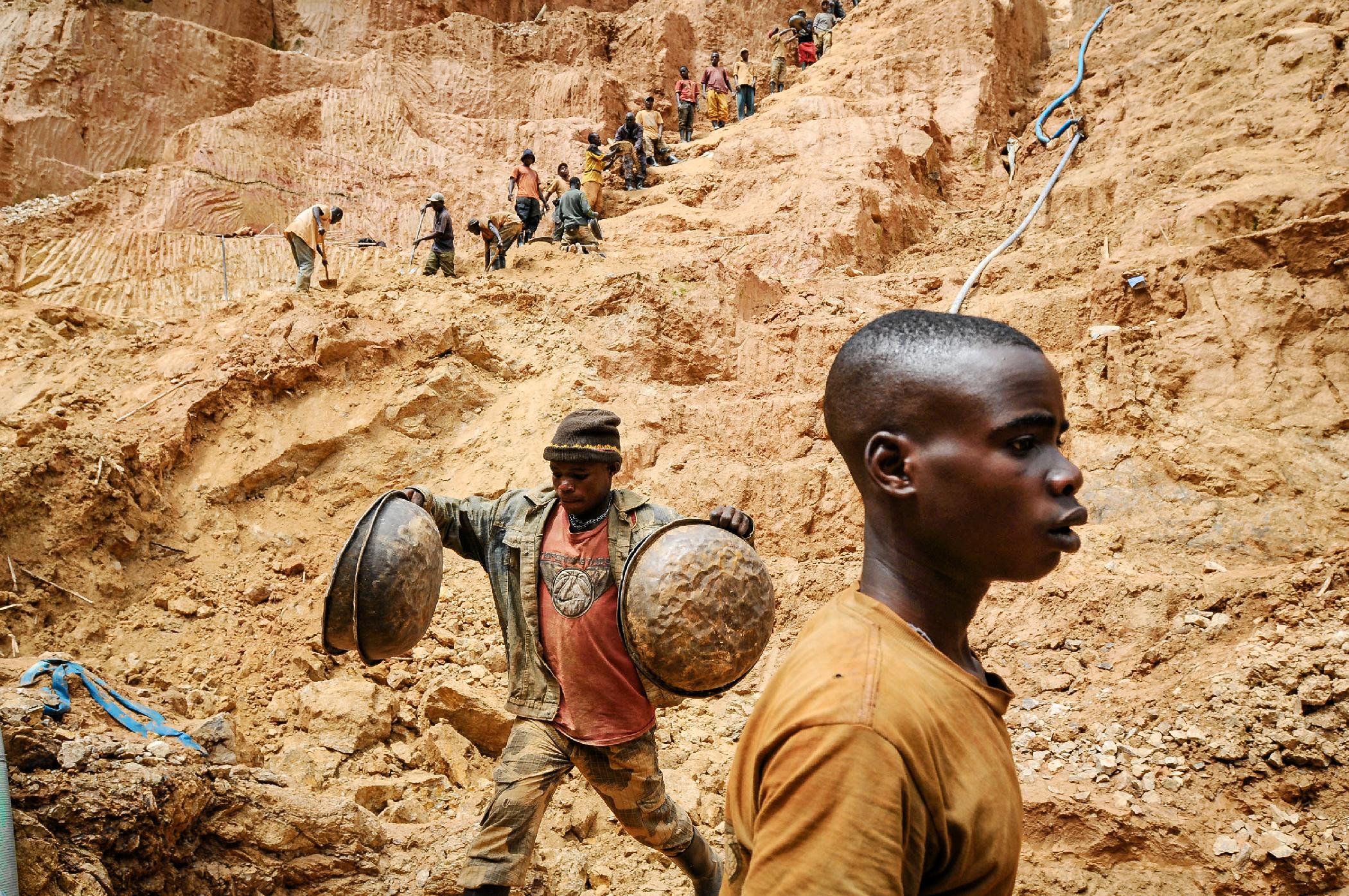
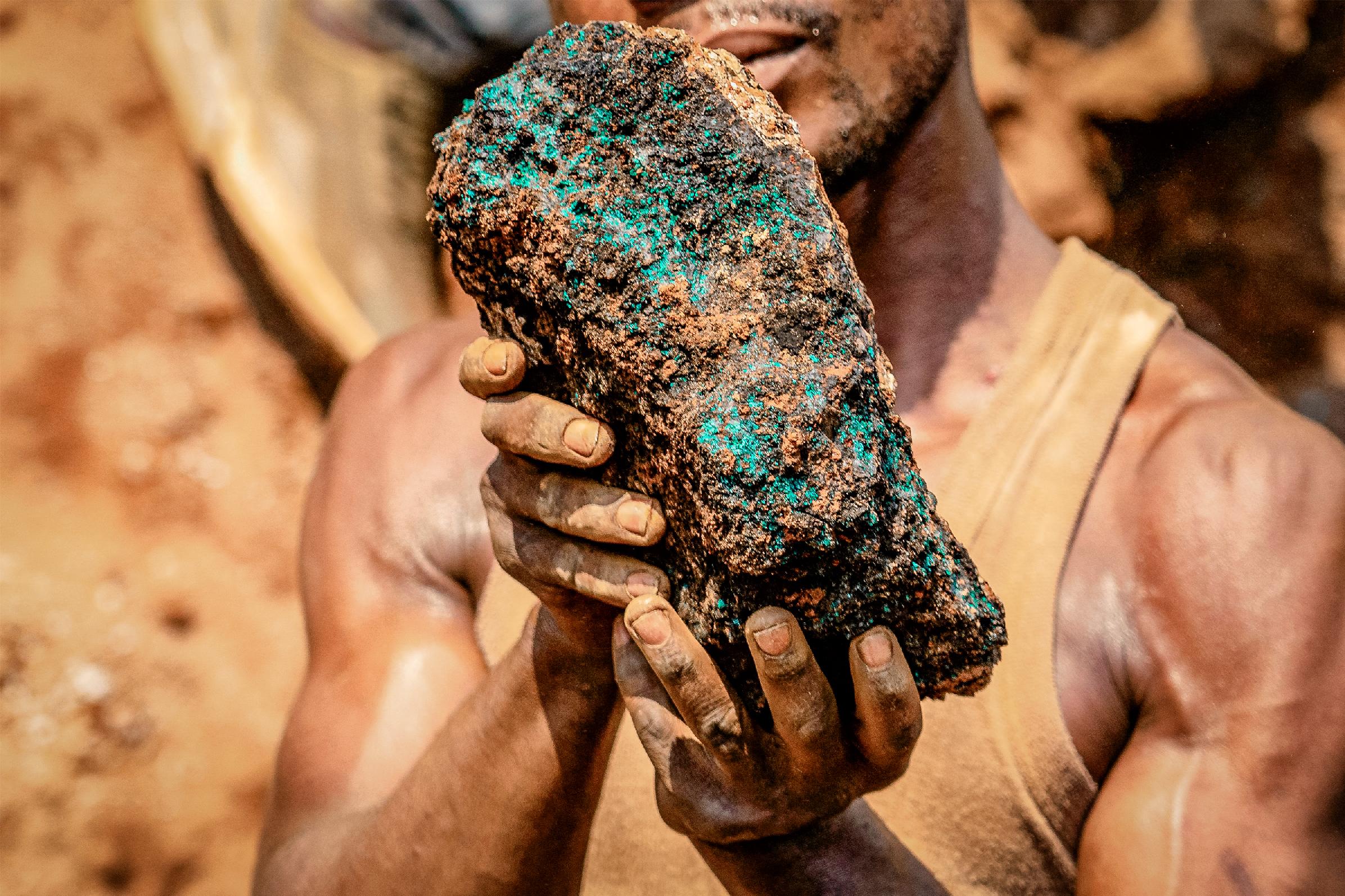
The DRC case, said Toby Shapshak, another South African tech expert, highlights “decades of U.S. neglect” of the importance of Africa and its minerals.
“The Biden administration has realized what a massive strategic mistake this was, and is trying to rectify things and making strong overtures to Africa. But it may be too late because much of Africa already seems dedicated to Beijing and Moscow,” he told The Epoch Times.
“The U.S. is playing a desperate game of catch-up.”
Speaking during the Atlantic Council webinar, Nii Simmonds, a senior fellow at the GeoTech Center in Washington, said: “The next industrial revolution will be based on critical and rare-earth minerals.
“Many of these minerals, like coltan, are strategic materials, because most modern technologies are defense-related.
“Current technologies such as satellites, semiconductors, fiber optics, CAT scan equipment, electric vehicle batteries, and smartphones wouldn’t exist without these minerals.
“And these technologies wouldn’t exist in the numbers they do today without countries such as the DRC, South Africa, Zimbabwe, Ghana, Nigeria and Namibia.”
Ms. Hargis said semiconductors and flash memory products had become “essential to modern civil and defense technology,” powering everything from “smartphones to self-driving cars, and their importance is growing daily.”
She’s also an expert in national security and has spent more than a decade studying the domestic politics and foreign affairs of China and Taiwan.
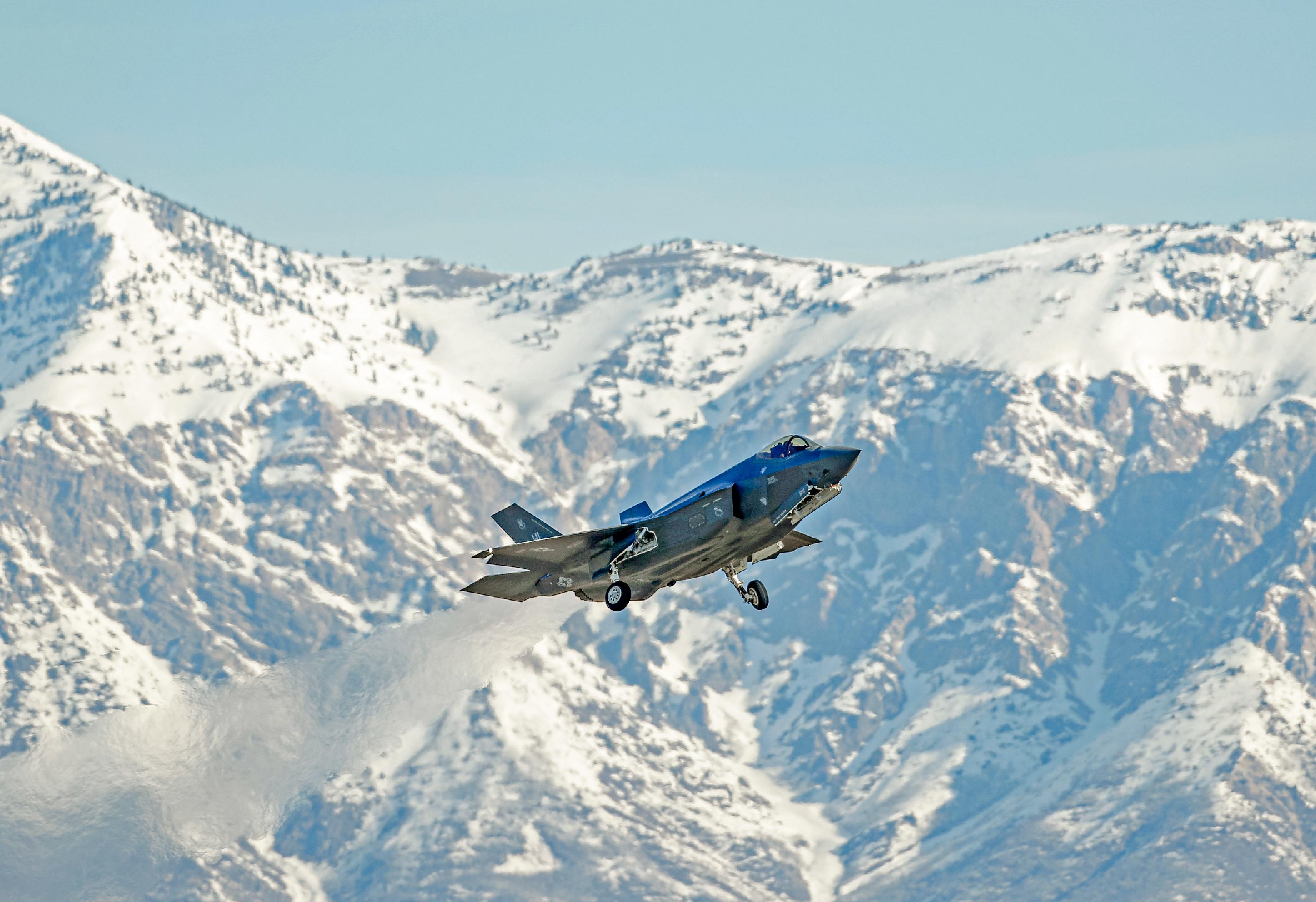
“The fighter jet actually needs an enormous quantity of strategic materials. Once quantum computing comes online, it will also require substantial amounts of gold and other critical minerals,” said Ms. Hargis.
Semiconductors and quantum computers can only be produced with critical and rare-earth minerals, found in large quantities in Africa.
“We’re talking here about minerals such as cerium, scandium, and lanthanum. No one’s heard of them but they’ve become essential in the modern world,” said Mr. Shapshak.
“They’re all used in computers, smart TVs, high-grade weapons of war, electric vehicles, clean energy systems, communications systems; you name it,” he said.
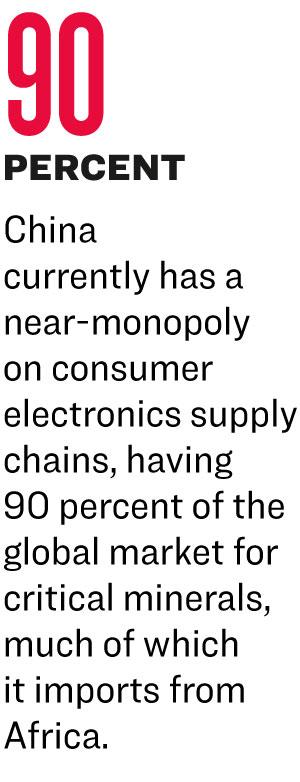
“Take these minerals away and you collapse most consumer electronics supply chains.”
China currently has a “near-monopoly” on these critical materials having 90 percent of the global market for critical minerals, a lot of which it imports from Africa.
“China, and to a lesser degree Russia, takes these raw minerals from Africa and they process them, meaning the world has to access them via China and Russia in many cases,” said Mr. Shapshak.
This monopoly could easily disrupt global semiconductor and electric vehicle supply chains in the future.
“The future of semiconductors, flash memory, and electric vehicles necessitates secure and consistent access to these minerals. Establishing alternative resources that are economically viable, like those in Africa, will diversify global supply chains while decreasing dependence on one nation or region,” the report concluded.
“The continent holds about 85 percent of the world’s manganese, 80 percent of the world’s platinum and chromium, 47 percent of cobalt, 21 percent of graphite, and 6 percent of copper.”
Ms. Hargis said to secure vital resources for Western supply chains and national security efforts, the United States should “incentivize and strengthen collaborative private-sector partnerships with African countries that share democratic and rule-of-law values.”
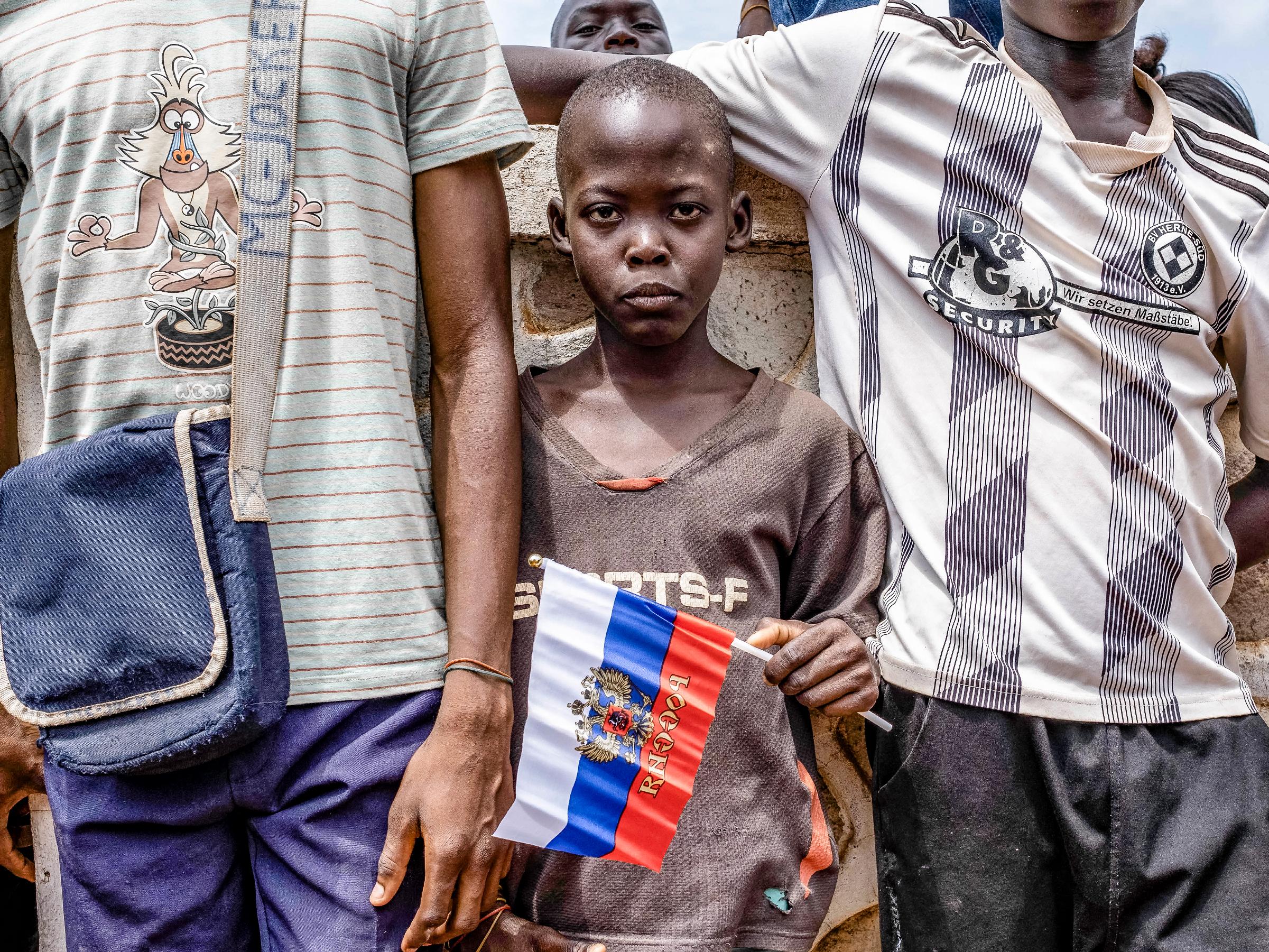
But, should the United States insist on doing business only with African countries that share these values, said Sizwe Mpofu-Walsh, a lecturer in international relations at Johannesburg’s Wits University, “it’ll be shutting an awful lot of doors.”
“The DRC, for example, is certainly not the ‘Democratic Republic’ of Congo. Zimbabwe, a country rich in many of the minerals the world needs, is under U.S. sanctions because the [President Emmerson] Mnangagwa regime is guilty of so much corruption and human rights abuses.
“The list of African countries that are mineral-rich and share the American version of democracy and rule-of-law is a short one.”
Nevertheless, the United States is making progress in securing access to African reserves of rare-earth minerals, most notably by means of Washington’s Lobito Corridor Project.
“It’s clear that the United States has decided to build the railway to Angola’s biggest port on the Atlantic because it’s locked in competition with China for Africa’s rare-earth minerals,” said Candice Moore, a specialist in U.S.–Africa relations at Wits University in Johannesburg.
“Of course, the United States is also trying to win hearts and minds in Africa, and the project helps on that front too, because it’ll boost growth, trade, and investment in a strategically very significant part of Africa, not to mention create thousands of jobs for locals,” she told The Epoch Times.
Instead of exporting critical materials to China, said Mr. Simmonds, African countries could use these laws to support the development of their own legislation, framework, and supplier ecosystem networks required to process their own minerals and metals.
Ms. Hargis urged Western policymakers to support their multinationals to promote growth in Africa by focusing on manufacturing, chip design, quality control, and research and development.
“They can create incentives for U.S. and other Western companies to extend semiconductor, flash memory, or electric vehicle supply chains to African countries,” she said.
Ms. Hargis said progress had already been made on this front: Google has an R&D lab in Ghana; Microsoft has two in Kenya and Nigeria and IBM has two in Kenya and South Africa.
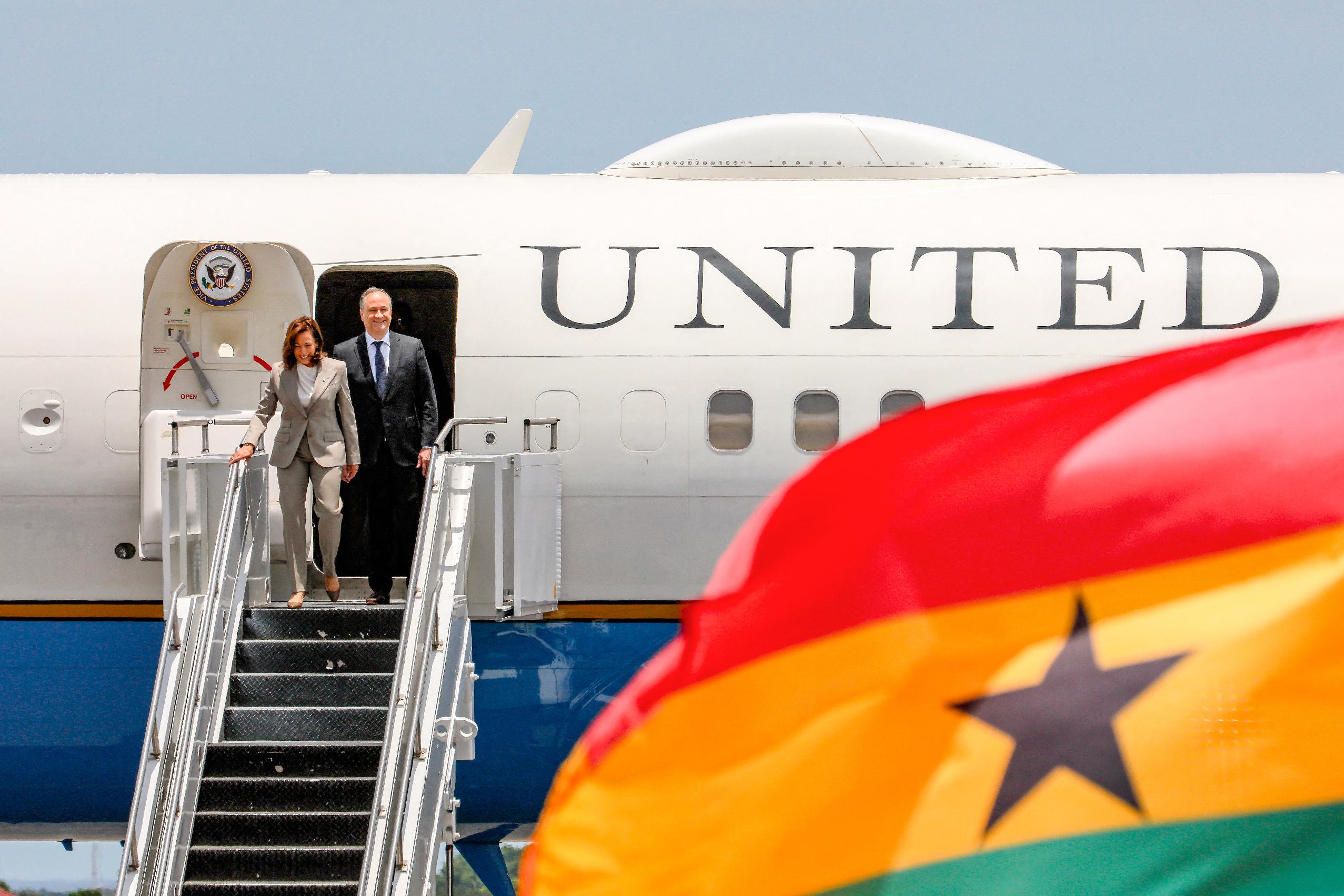
China’s Military, Political Models in Africa
As it attempts to get even stronger in Africa, the Chinese regime is establishing “political education training schools for present and future African leaders” across the continent, with CCP officials teaching that ruling parties should be superior to governments and courts.The first of these, and the first to be built by the CCP on foreign soil, was established in 2022 at Kibaha in eastern Tanzania.
The political organization Mr. Nyerere founded in 1977, the Party of the Revolution, or Chama Cha Mapinduzi (CCM), and its predecessor, the Tanganyika African National Union, have ruled Tanzania without interruption since the country’s independence 62 years ago.
CCM presidential candidates always win elections by landslides and currently, 94 percent of members of parliament are CCM members.
The Nyerere Leadership School was funded by Chinese state money. But, on its website, the institution, calling itself a “modern Party School,” says it was “jointly established” by the Former Liberation Movements of Southern Africa (FLMSA).
These are the CCM, South Africa’s African National Congress (ANC), the Mozambique Liberation Front (FRELIMO), the Popular Movement for the Liberation of Angola (MPLA), the South West Africa People’s Organisation (SWAPO), which rules Namibia, and the Zimbabwe African National Union Patriotic Front (ZANU-PF).
These parties have governed their respective countries for decades, their rule often reinforced by means of corruption, fraudulent elections, and violent suppression of opposition.
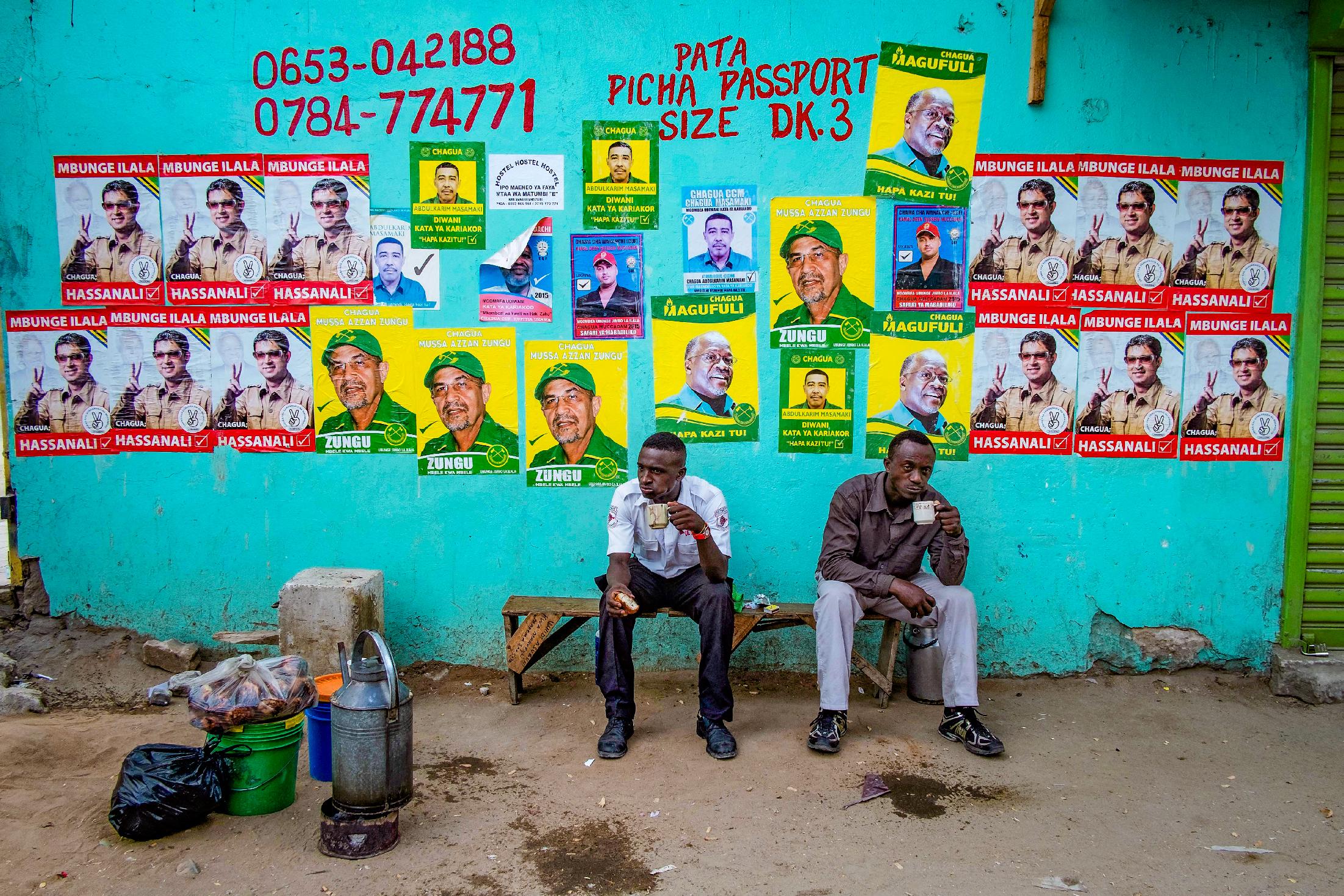
“The Chinese government obviously selected these countries as partners for its first so-called leadership school in Africa because they all display features of being autocratic states, with ruling parties having been in power for a long time,” said Cobus van Staden, co-founder of the China Global South Project in Johannesburg.
“These countries’ ruling parties identify strongly with China. Like the CCP, these ruling elites maintain tight control of security agencies. They centralize all power in the state, with little to no appetite for independent oversight. These are all countries that were formerly ruled by white colonial or apartheid regimes.
“So this school, like China’s 61 Confucius Institutes in 46 African countries, is designed to counter Western ideals of democracy and to promote Chinese culture and language in Africa,” said Mr. Van Staden.
“When it establishes these institutions, China is indirectly saying to Africans: ‘Why should you follow what the racist West says is the best way of political governance?
“Why should you only speak English and French, the languages of the colonizers, when you can speak Chinese, too, which is the language of the future?’”
Mr. Nantulya said Confucius Institutes are “more subtle” attempts by Beijing to win influence in Africa, but that the CCP “ultimately” controls them.
“Confucius Institutes are established through partnerships between Chinese universities, host country universities, and the Hanban. The Hanban is an agency of the Chinese ministry of education and is affiliated to the CCP. Its official brief is to promote Chinese language and culture,” he said.
“Confucius Institutes are based at African universities, but they’re funded and controlled by the Hanban.”
Mr. Van Staden said Confucius Institutes and the Nyerere School show China is willing to “play the long game in building influence” in Africa.
“I’m sure the school in Tanzania won’t be the last of its kind in Africa,” he said.
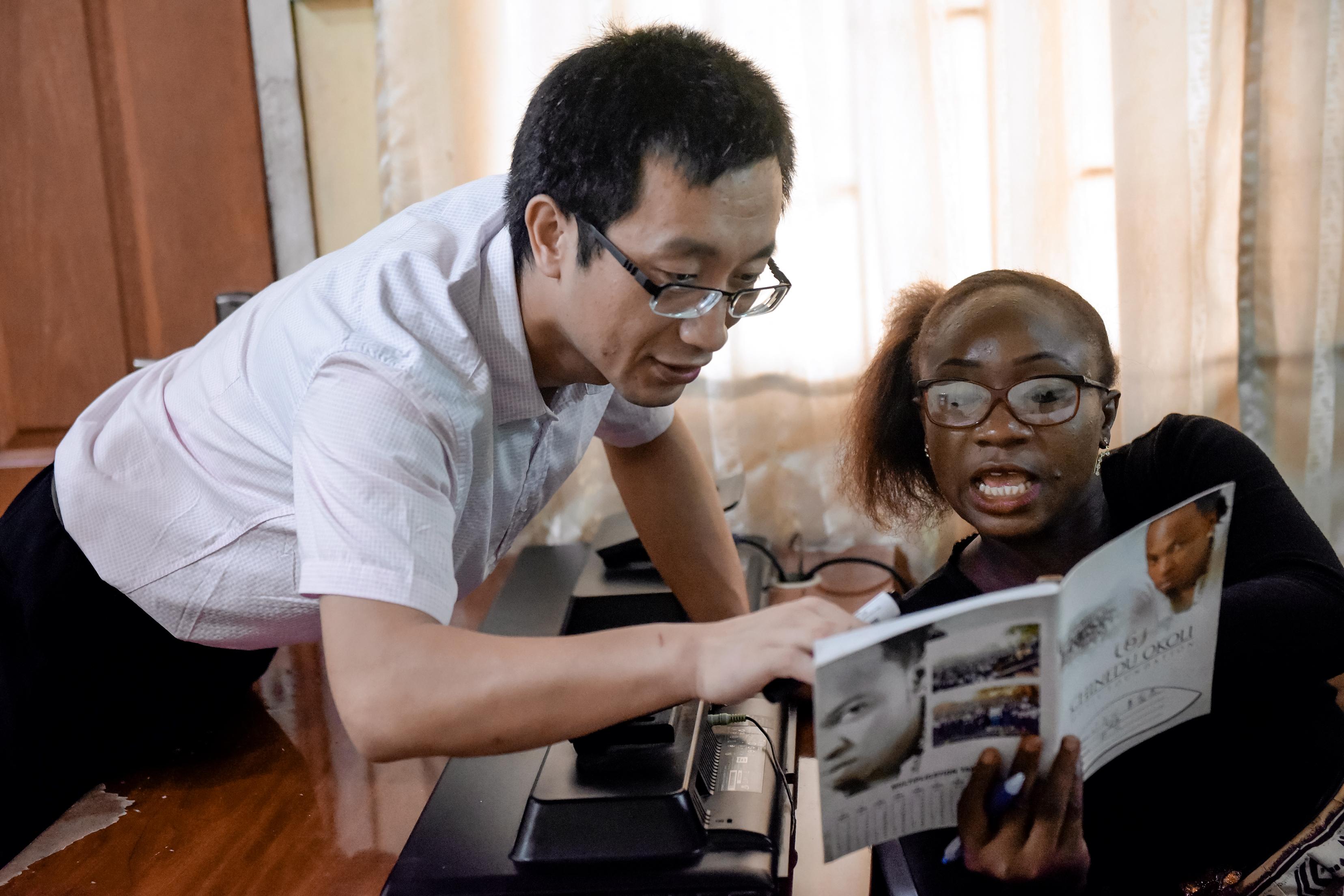
Professor Ibbo Mandaza, a renowned Southern African academic and fellow at the Foreign Policy Research Institute in Philadelphia, told The Epoch Times the school is “blatant proof” that Beijing is exporting its model of governance.
“It’s part of its effort to challenge the Western-led world order, to establish a New World Order, and a key part of this New Order in the future will be a political bloc in Africa that either turns a blind eye to authoritarianism or is authoritarian itself,” he said.
In an interview with The Epoch Times, the Nyerere School’s principal, Marcellina Chijoriga, who’s also a leading CCM member, said the institution “has at its core the promotion of African economic and social development and to end poverty.”
She emphasized: “The best way to do this is to train better leaders.”
Collin Ngujapeua, an official of Namibia’s ruling SWAPO party, participated in a “training course” at the Nyerere School in 2023.
He told The Epoch Times: “These Chinese teachers came in; they said they were political theory experts from the CCP’s Central Party School in Beijing. Over a few days they told us about how they govern and why China as a state is so successful.
“Basically their message was that real development in a country can only happen when the ruling party has absolute control over everything, and that only extreme discipline in the party can prevent outsiders from causing things to fall apart.”
Mr. Ngujapeua said the “Chinese theoreticians” explained that “governance will only succeed if ruling parties and governments are one and the same, and speak with one voice.”
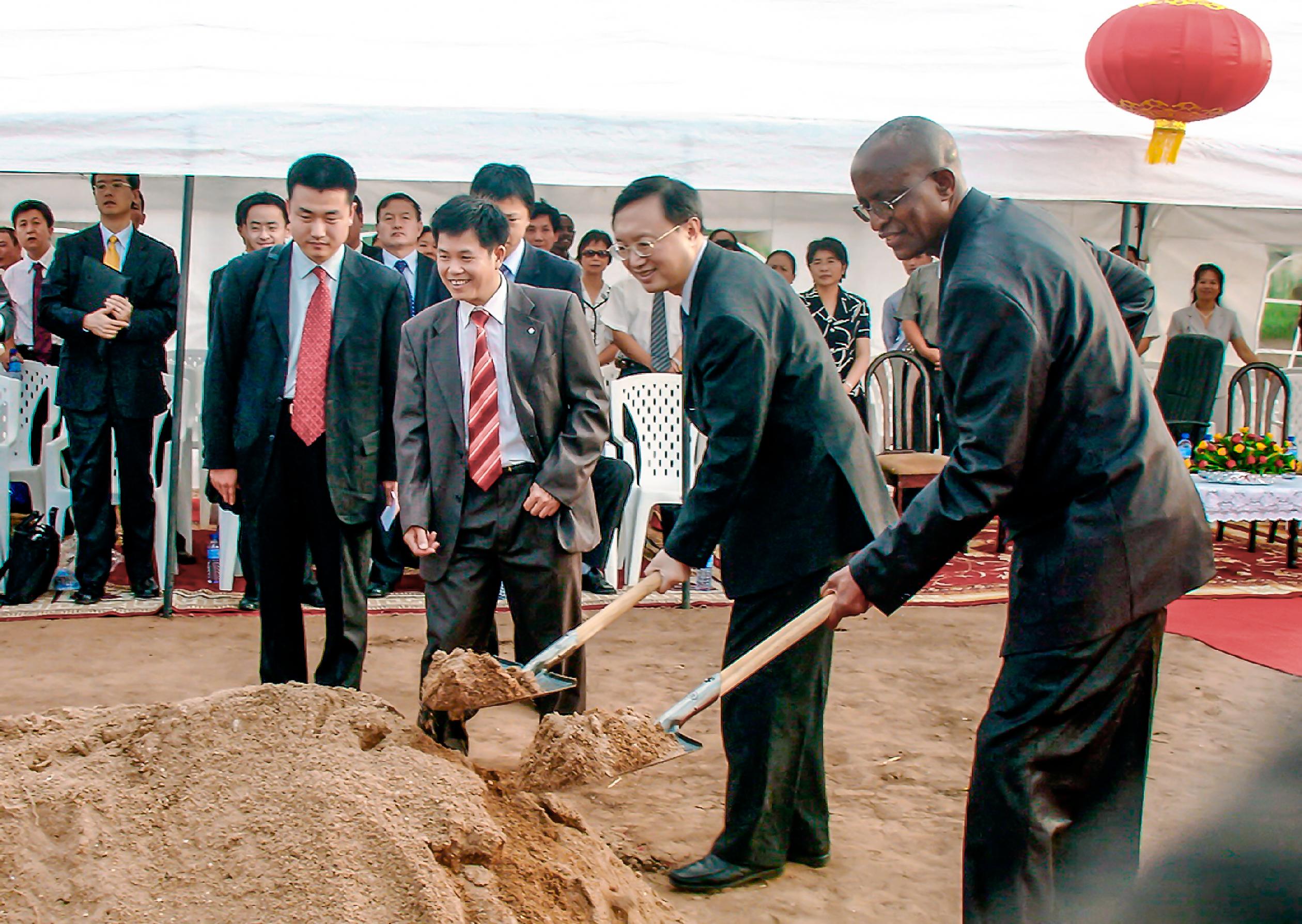
Mr. Van Staden said the CCP’s founding principle was “absolute party control of government.”
“China absolutely doesn’t want multiparty democracy in Africa. The Chinese want the stability brought about by doing business with a single party, forever. They don’t like anything that upsets the applecart.
“The CCP wants autocracy in Africa. It wants de facto single-party rule in Africa because that makes it much easier for it to achieve its goals in Africa,” he said.
Mr. Mandaza said: “What better way for the Chinese to get access to Africa’s vast mineral wealth than to have in place regimes that are totally on the same page as the CCP? That are closely tied to the CCP?”
The school in Kibaha is open only to “up-and-coming, usually young” members of African ruling parties, according to Ms Chijoriga.
“The fact that opposition politicians aren’t allowed into the facility says everything about what’s going on here: Grooming of future political leaders to be allies of Beijing and enemies to the West,” said Mr. Mandaza.
Ms. Chijoriga denies that the institution is “teaching the dictators of tomorrow” and was a “mouthpiece for China propaganda.”
She said: “It is undeniable that China’s development model has succeeded over the past 20 years and more. Africa is not the only one learning from China, the whole world is.
“China’s economic success is because it has had the strong leadership of the CCP. We must follow that map.”
Asked why her school enrolled only members of ruling elites and excluded members of opposition parties, Ms. Chijoriga claimed African opposition parties are “against” China, and “pro-West.”
“Why must we accept these disrupters into our school?” she asked. “They will only cause trouble.”
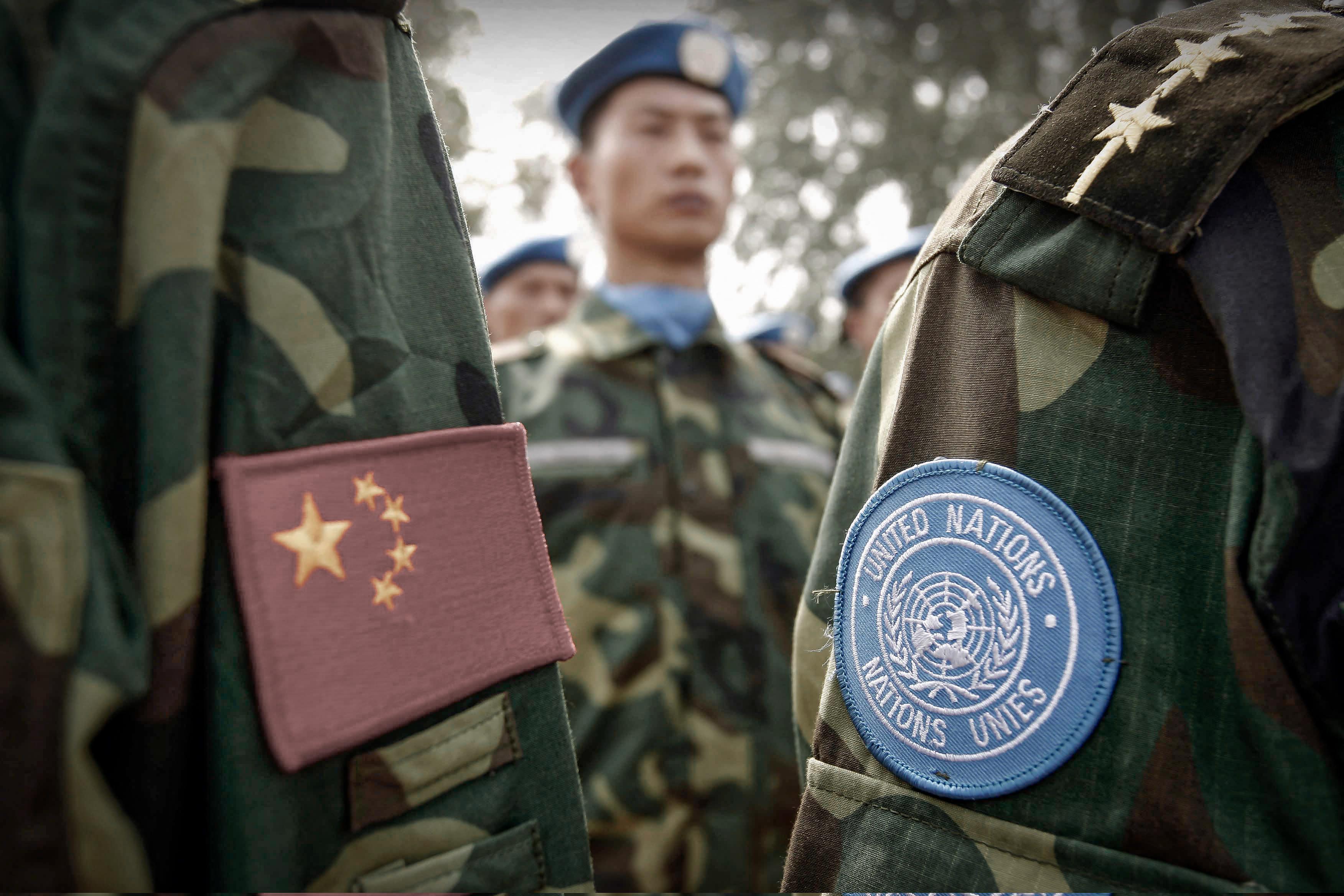
Mr. Nantulya said the purpose of the Chinese regime’s cooperation with Africa’s former liberation movements “has never been a secret.”
“Along with the CCP, these ruling parties represent a united front. This ‘united front’ is a CCP strategy that garners support around the world to advance the CCP’s and China’s interests and to isolate perceived enemies,” he said.
“So what China is doing, slowly but surely on the continent with its education facilities, is to create a crop of Africans that agree with the CCP’s way of doing things when it comes to political governance. This in turn will open up a lucrative front for China in the Africa of the future.”
Mr. Mandaza said in the race for access to Africa’s resources, which include minerals essential to the functionality of modern-day electronic devices, electrical vehicles, and weapons systems, China’s doing “anything and everything possible” to win the hearts and minds of young Africans.
“The long-term idea is that educated Africans will gaze to China rather than Europe and America for leadership, blueprints for social, economic and political development, and intellectual motivation,” he said.
Mr. Mandaza added that this approach was, in itself, a colonial model.
“Colonialism was never just about foreigners simply stealing land in order to get gold, diamonds, coal, or whatever. It was also about the systematic and systemic indoctrination of indigenous people, and especially their leaders, in order for the colonizers to achieve cultural domination and exploitation.”
Today, the CCP flag flutters in the breeze alongside those of Africa’s former liberation movements at the entrance to the school in Kibaha.
“That flag is there for several purposes,” said Mr. Mandaza. “One of those purposes is symbolic, to symbolize China’s cooperation with Africa. But Africans should remember that their former colonizers also loved planting foreign flags all over the continent and constructing fancy buildings.”
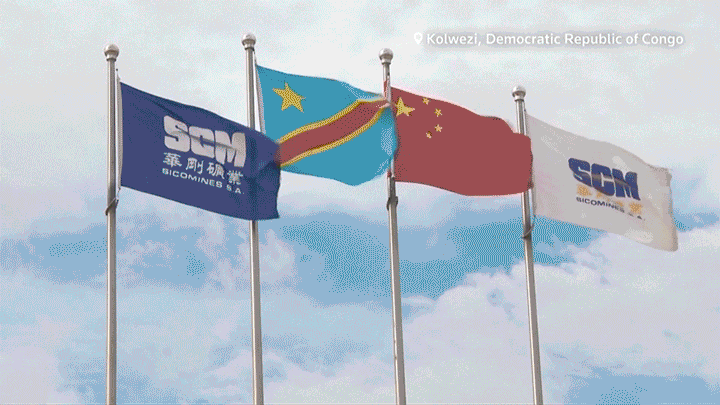
China’s Expanding Military Footprint
China’s expansion in Africa in recent years has also been characterized by increased military cooperation with countries on the continent.The CCP’s army is training thousands of African soldiers and officers and wants to build a second base in Africa.
Analysts and human rights workers are concerned that China is grooming military officers to suppress domestic dissent, and even to lead coups against governments perceived to be “too close to the West.”
Others, however, don’t have a problem with China’s increased military engagement in Africa.
“Why is it a problem when China trains African security forces, but not a problem when America or the United Kingdom does the same?” asked Johannesburg-based independent political analyst, Lindiwe Makhulu.
“The United States has 20 bases across Africa; as far as I know China has only one” she told The Epoch Times.
Washington has, indeed, had a security presence in Africa for decades, expanding its military stamp significantly after President George W. Bush declared a “War on Terror” following the 9/11 terror attacks in 2001.
“The command also operates out of 12 other posture locations throughout Africa,” he said in his prepared testimony. “These locations have minimal permanent U.S. presence and have low-cost facilities and limited supplies for these dedicated Americans to perform critical missions and quickly respond to emergencies.”
But one of Africa’s top defense and military analysts, Helmoed Heitman, who’s also a former high-ranking member of the South African army, told The Epoch Times the United States had 18 “bases or outposts,” in addition to Camp Lemonnier and Ascension Island, on the continent.
Chinese foreign minister Wany Yi recently visited Egypt, Tunisia, Togo, and Cote d'Ivoire—all coastal African countries, stirring speculation that China was interested in constructing a second military base on the continent.
The high-level Chinese visit occurred around the same time the French withdrew troops from West Africa and the Sahel region, and a corresponding surge in terror-related deaths.

Mr. Heitman said the United Kingdom’s ongoing military presence in Kenya was also “by no means” certain.
“You can bet China’s watching these developments closely, to see if the Americans and the British will follow the French and exit the African arena, and that would be the ideal time for China to build on its existing systems and existing single base,” he said.
China opened its first, and so far only, military base in Africa in Djibouti in 2017 becoming involved in anti-piracy missions and securing safe passage for Chinese vessels trading with Africa.
Other nations, including the United States, also maintain military bases in Djibouti for these reasons. Washington also uses its installation in Djibouti to launch strikes on the al-Shabaab terror organization in neighboring Somalia.
Ms. Makhulu suggested China’s potential military expansion in Africa could be influenced by past events, like when an outbreak of conflict in oil-rich Libya in 2011 left about 35,000 Chinese workers stranded.
“With the many thousands of Chinese now on the ground in Africa, working on megaprojects and in mines in some pretty dangerous places, it’s feasible that the government of China could use that to justify the construction of another major military base in Africa.
“You can bet the next crisis that will endanger Chinese workers is just around the corner, and Beijing doesn’t want another PR disaster like what happened in Libya,” she said.
But Alex Vines, director of the Africa project at UK think tank Chatham House, doesn’t think Beijing’s “quite ready” to establish another major military base in Africa.
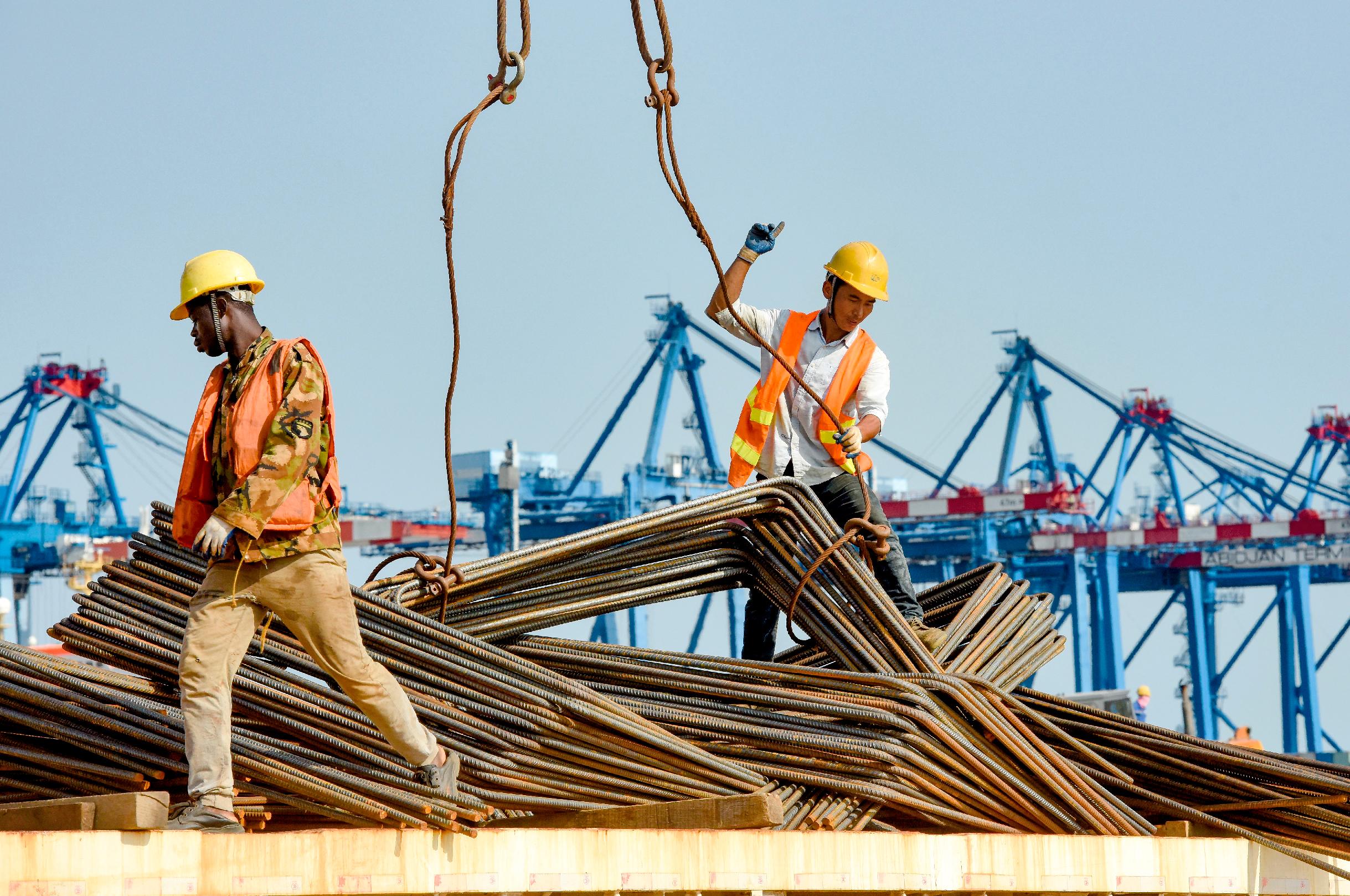
“It’s more likely that China will seek to expand the existing civilian port infrastructure and build dual-use facilities in African ports that it has invested in. China would upgrade harbors to allow the Chinese navy to use them, in addition to China’s commercial vessels,” he said.
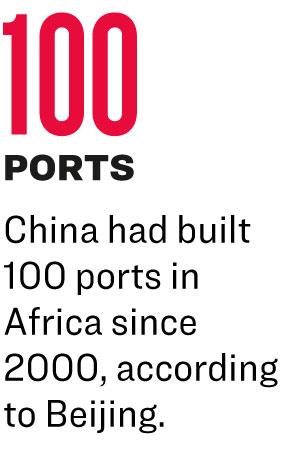
Mr. Heitman said it was also likely that rather than invest in a military base “just yet,” China will increase its “professional military education” of African security forces.
“China’s Communist Party wants to win hearts and minds in Africa, and if it wins the hearts and minds of tens of thousands of African police and army officers … well, that’s a big win,” he said.
Mr. Nantulya said China sees its training of African police and soldiers as “an opportunity to promote China’s governance model while deepening ties to Africa’s ruling political parties.”
He told The Epoch Times: “China has this term called ‘military political work.’ This term shows the CCP has no problem broadcasting the fact that it uses the PLA to stay in power.
“Military political work describes all the activities of the PLA to shape the civilian environment to achieve political, ideological, and military objectives set by the CCP, and Beijing is actively exporting this model to Africa, by means of its ‘political military education’ to African security forces.”
The Nanjing Army Command College’s African alumni include 10 defense chiefs, 8 defense ministers, and several former presidents, including Laurent Kabila of the DRC, Joao Bernardo Vieira of Guinea-Bissau, and Jakaya Kikwete of Tanzania.
None of these were known for their adherence to democratic principles, but Mr. Heitman said they “paled by comparison” with two current presidents schooled at the same institution, namely Isaias Afwerki of Eritrea and Emmerson Mnangagwa of Zimbabwe.
Both are alleged to have committed widespread human rights atrocities, including torturing and murdering political opponents.
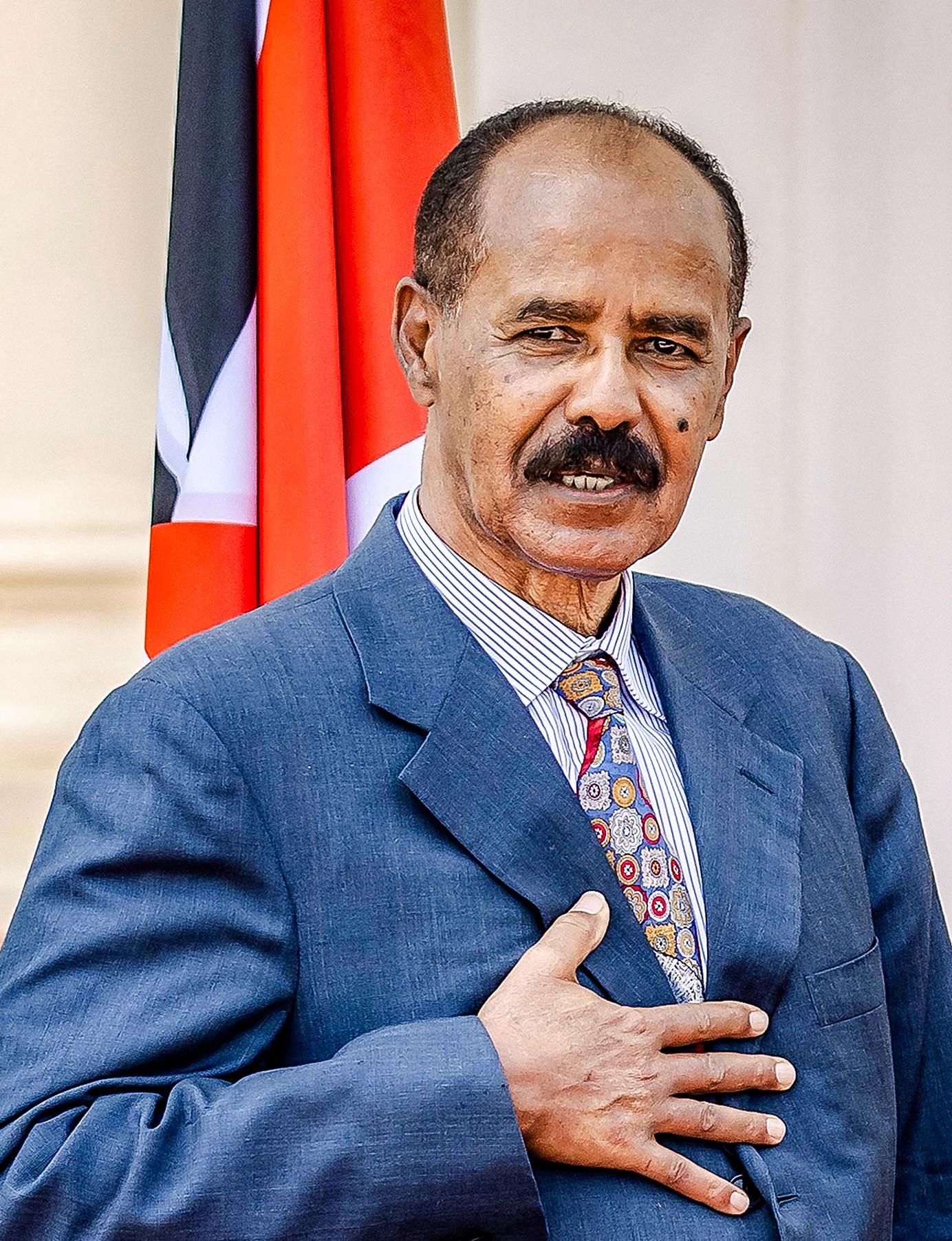
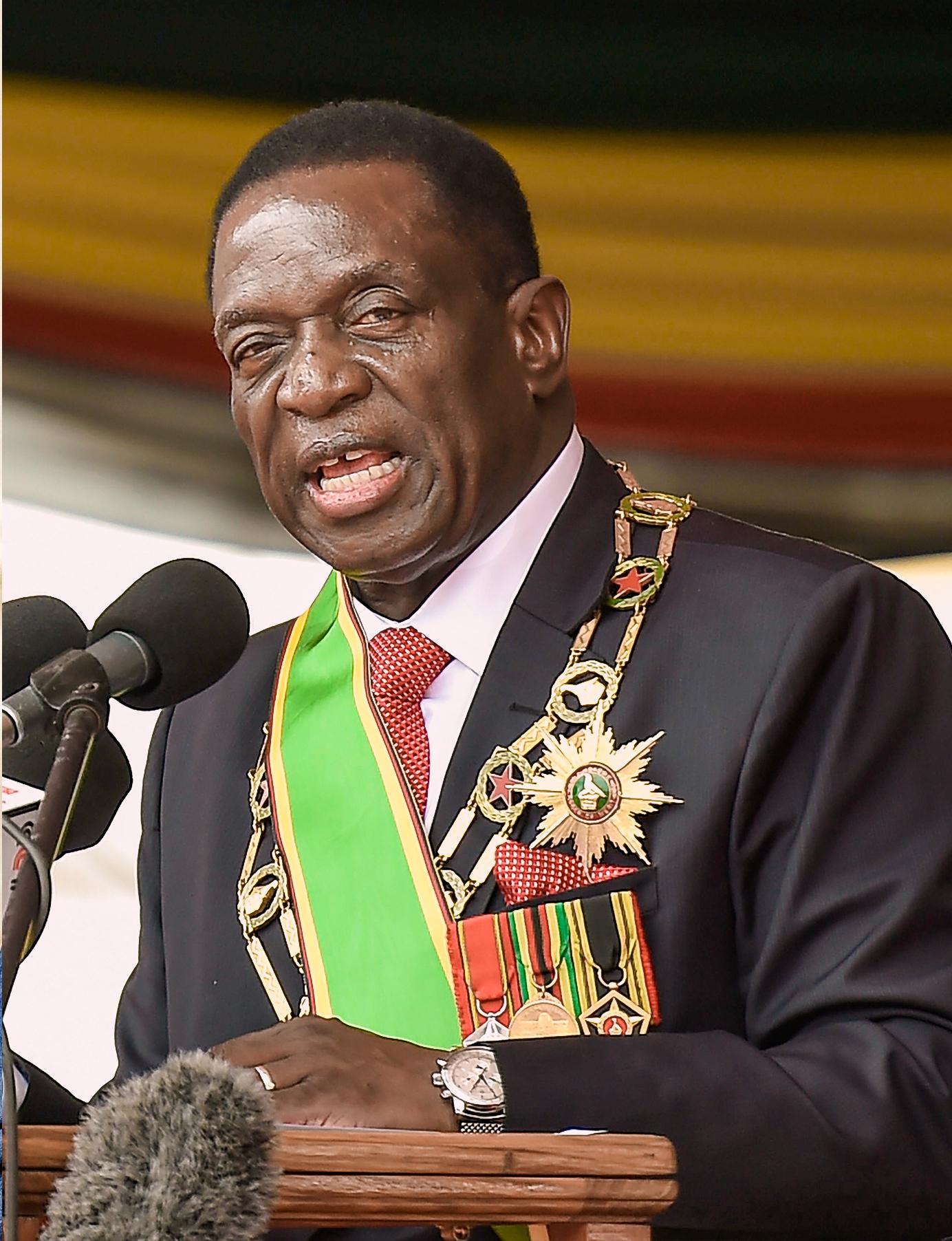
Mr. Nantulya said 94 Mozambican senior officers had studied in Nanjing, including Maputo’s longest-serving defense chief, General Lagos Lidimo, as have their counterparts in Angola, Cameroon, Ghana, Namibia, Nigeria, South Sudan, Sudan, Tanzania, and Uganda.
In 2024, thousands of African military officers will receive instruction at facilities run by the CCP’s Central Military Commission.
The major difference between the military training provided by Western forces to Africans, and that given by China, said Mr. Heitman, was “simple.”
“The United States, for example, trains African soldiers to confront external enemies. China trains African soldiers to, in effect, oppress and oppose their own people.”
Mr. Nantulya took it further: “The PLA adheres to the principle of absolute party control of the military, or ‘the party commands the gun.’
“The CCP itself admits that this is how it has retained power since 1949. The PLA is not a national army of the type described in most African constitutions and laws governing the armed forces. It is a ‘political army’ and the backbone of the CCP.
“Uniformed members are loyal to the party and custodians of its values, history, and spirit, not to the constitution, government, or state. The CCP is above all three.”
According to his research, 50 of Africa’s 54 countries participate regularly in Chinese “political military education.”
A senior South African National Defense Force officer told The Epoch Times: “We’d love to send our officers to West Point, because the training there is far superior. But the simple fact is that China’s offering more training opportunities than anyone else.”
In the 1990s, during a wave of democracy, African countries—even those governed by former liberation movements where it was the norm for political parties to control armies—adopted new models that removed militaries from party politics and transferred their allegiance to the constitution.
However, democracy has declined in Africa over the past decade, and China’s “party-army model” is increasingly attractive to parties “focused on regime survival.”
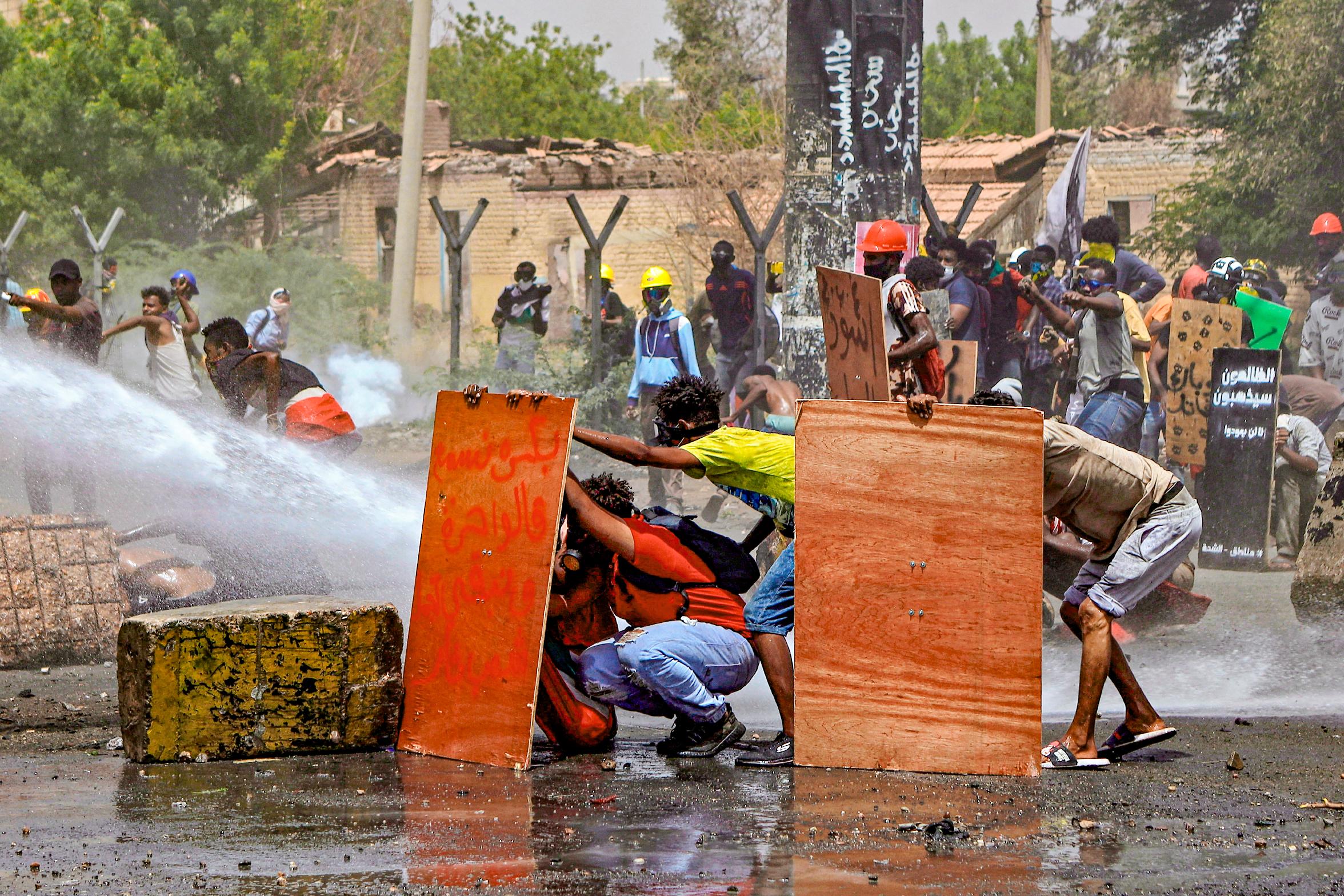
China’s Mistakes in Africa
Mr. Simmonds said the West should “capitalize” on China’s “missteps” in Africa.He pointed out that China does not encourage its multinationals to invest where value-addition is possible or to open research or manufacturing centers in Africa.
“Beijing’s instead mainly focused on the extraction of minerals. Western countries can gain the upper hand against competition from China by capitalizing on these shortcomings in Chinese investment and offering a more attractive partnership model,” he emphasized.
There’s also rising anti-Chinese sentiment in Africa following allegations down the years of Beijing’s companies abusing workers, and even colluding with criminals.
Security and intelligence analysts have told The Epoch Times that Chinese mining companies are cooperating with organized crime groups, terrorists, and corrupt government officials to operate illegal mines in Africa and to effectively steal valuable minerals and metals.
Several foreign and African diplomats spoken to by The Epoch Times reported rising tensions between Beijing and some African administrations, because of the unfolding situation and the presence of Chinese criminals in their countries.
“There’s strong evidence that Chinese mining firms have funded Islamic militants to disrupt legal mining activities in several African nations,” said Jasmine Opperman, a security consultant based at the University of Pretoria.
“Apparently, when the legal mining companies leave because of violent attacks by terrorists, the Chinese mining firms, sometimes supported by mafia-like groups, move in and take over the mines,” said the former South African intelligence agent who advises international investors about extremism and political violence on the continent.
David Ndii, one of Africa’s most respected economists and founder of Kenya’s Institute of Economic Affairs, told The Epoch Times African governments and private companies were making billions of dollars from Chinese investment, but this was “coming at a huge cost to the continent and its people.”
“It seems as if some of the Chinese then consider it their right to exploit the continent’s resources, including by means of illegal mining,” he said.
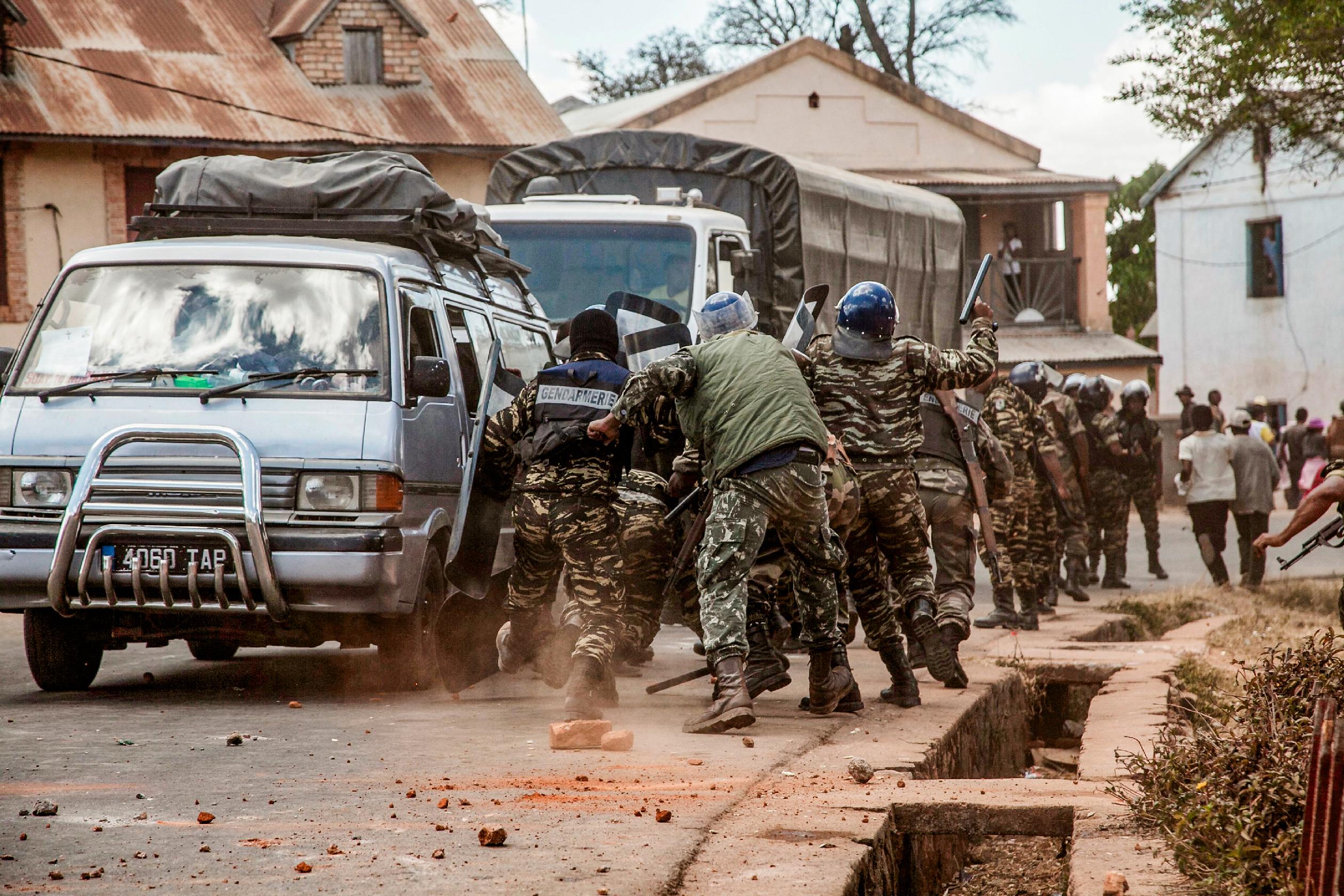
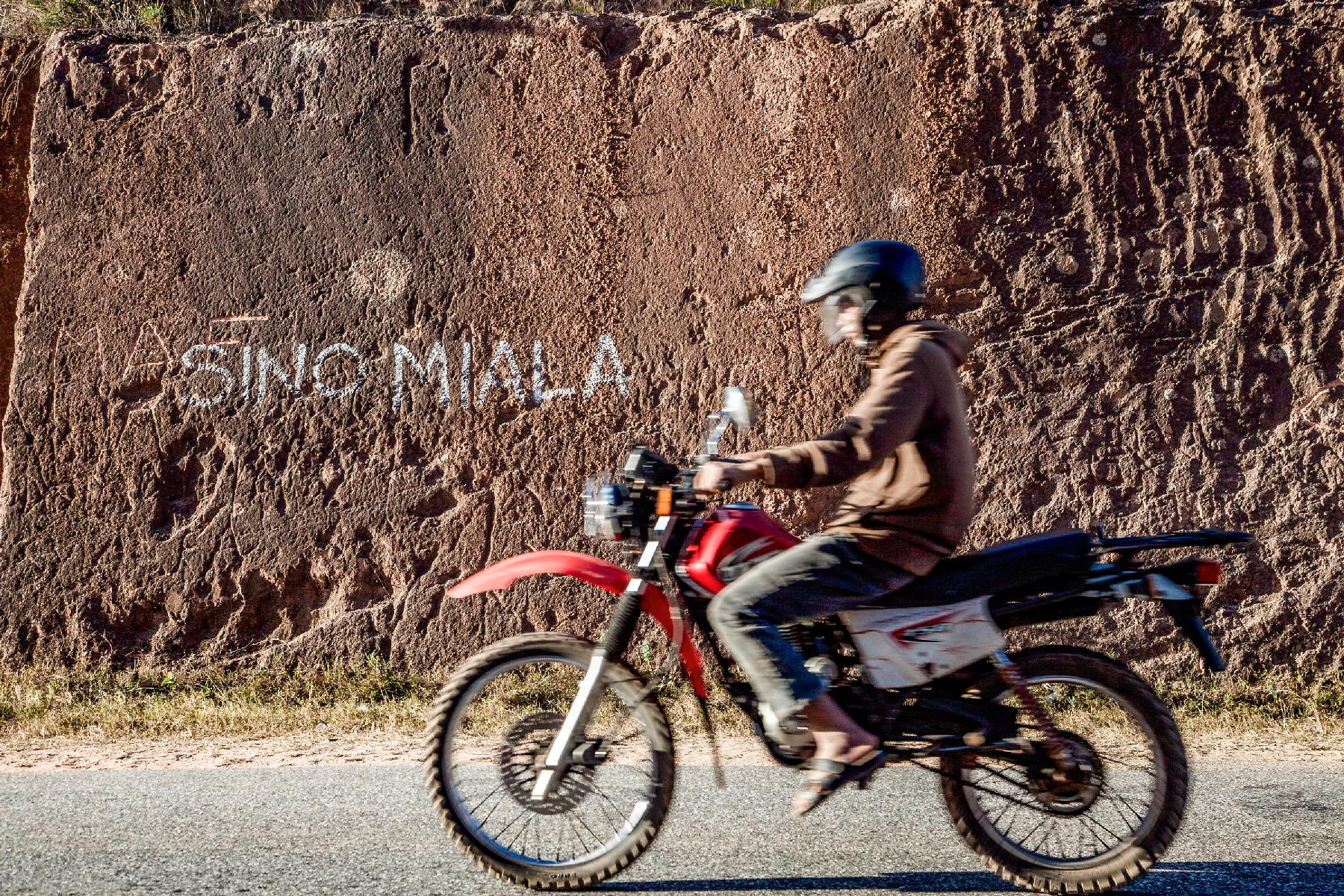
Mining experts say China’s metals industry can only maintain its massive size using imported minerals. But supplies are limited, so it is turning to criminal groups who supply “extra” metals mined illegally to bolster Beijing’s metals sector.
Now, after years of inaction, governments of countries strongly allied with Beijing are pushing back against alleged Chinese abuses.
Nigeria, a country that international affairs analysts consider to be moving closer to the West since Bola Tinubu was elected president in May 2023, has been particularly proactive against Chinese mining companies.
About a month after Mr. Tinubu took office, Nigeria’s Economic and Financial Crimes Commission (EFCC) arrested 13 Chinese workers.
“The firm was using granite mined illegally to manufacture marble for local sale in Nigeria. Some suspects didn’t have work permits; the Chinese are coming into Nigeria on tourist visas and then they work,” said EFCC chairman, Olanipekun Olukoyede.
He told The Epoch Times that within eight months last year, the EFCC had arrested more than 80 Chinese “unlicensed mining operators.”
“They also seized almost 30 truckloads of different kinds of minerals,” said Mr. Olukoyede.
He was charged and convicted with illegal possession of 25 tons of assorted crude minerals and is currently serving a five-year prison sentence.
“My contacts in Nigeria tell me that Chinese mining firms have been making security deals with terrorist groups. The insurgents protect illegal mines against so-called outsiders, and shield the Chinese from infiltration and attack,” said Ms. Opperman.
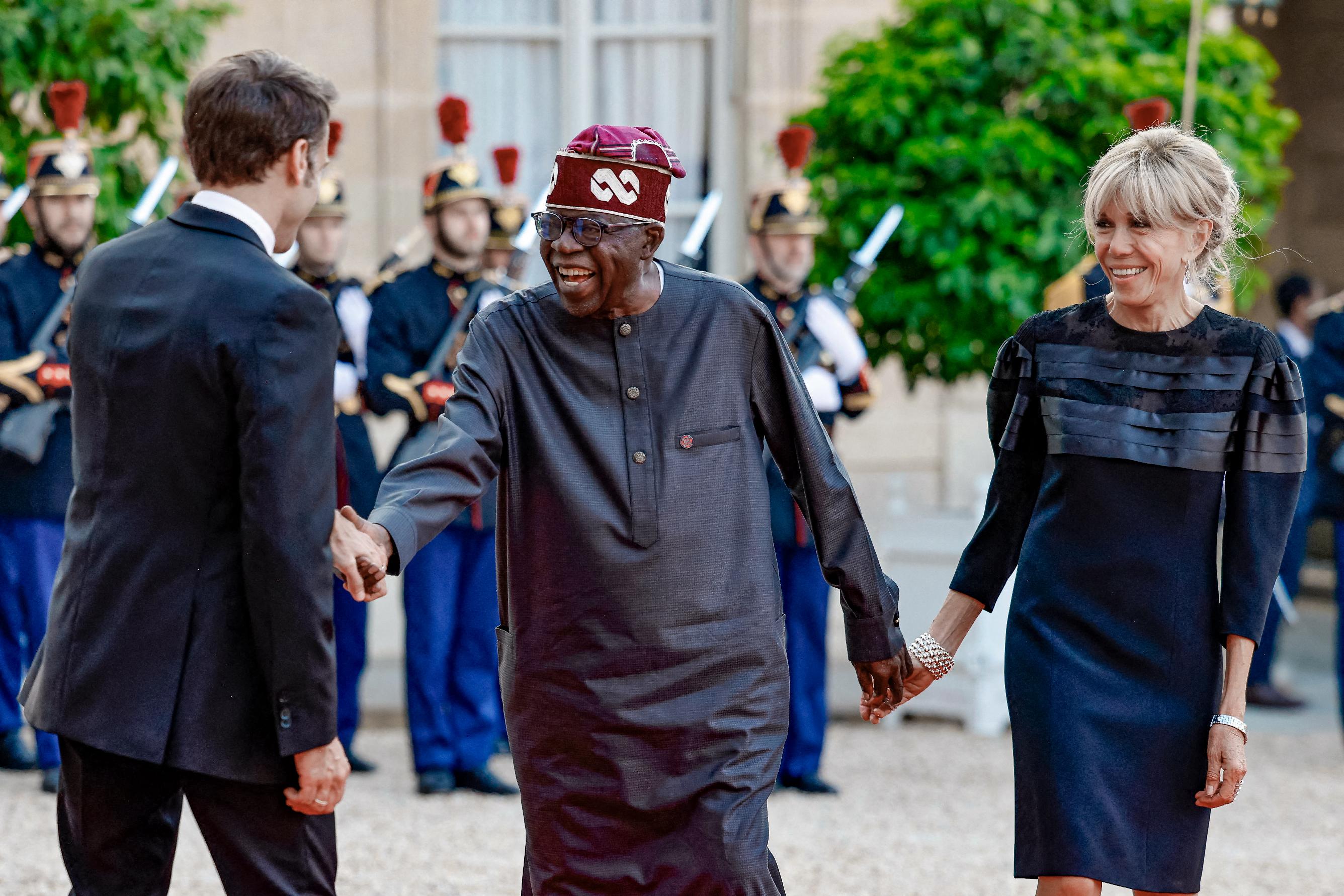
The Chinese Embassy in Nigeria denied that its nationals were cooperating with terrorists, saying it has always urged Chinese businesspeople to operate within the law.
China is particularly set on acquiring vast stocks of lithium, a metal used in the manufacture of a wide range of renewable energy products, including batteries.
Africa has some of the world’s largest lithium mines, including in Congo, Mali, South Africa, and Zimbabwe.
It found that the “rush” for Africa’s lithium, far from delivering a ‘just energy transition,’ risked fuelling corruption, and a range of other environmental, social, and governance problems.
“For generations, African nations have been exploited for their minerals, and as the demand for ‘[energy] transition minerals’ hots up there is a danger of history repeating itself,” the Global Witness report stated.
Mr. Soda said Chinese firms, including Zhejiang Huayou Cobalt, Sinomine Resource Group, Chengxin Lithium Group, Yahua Group, and Canmax Technologies had spent more than $1 billion since 2021 to purchase and develop lithium projects in Zimbabwe.
He told the media in Harare that most of these companies had built processing factories and were shipping lithium concentrates to China for “refined processing.”
The Global Witness investigation in Zimbabwe focused on the Sandawana mine, which is owned by companies linked to the ruling ZANU-PF party, a close ally of the Chinese Communist Party.
ZANU-PF has governed Zimbabwe since its independence from Britain in 1980. Since then it has been accused of massacring and imprisoning opponents and plunged the country into economic ruin.
It has reinforced its grip on power with fraudulent elections, critics have said.
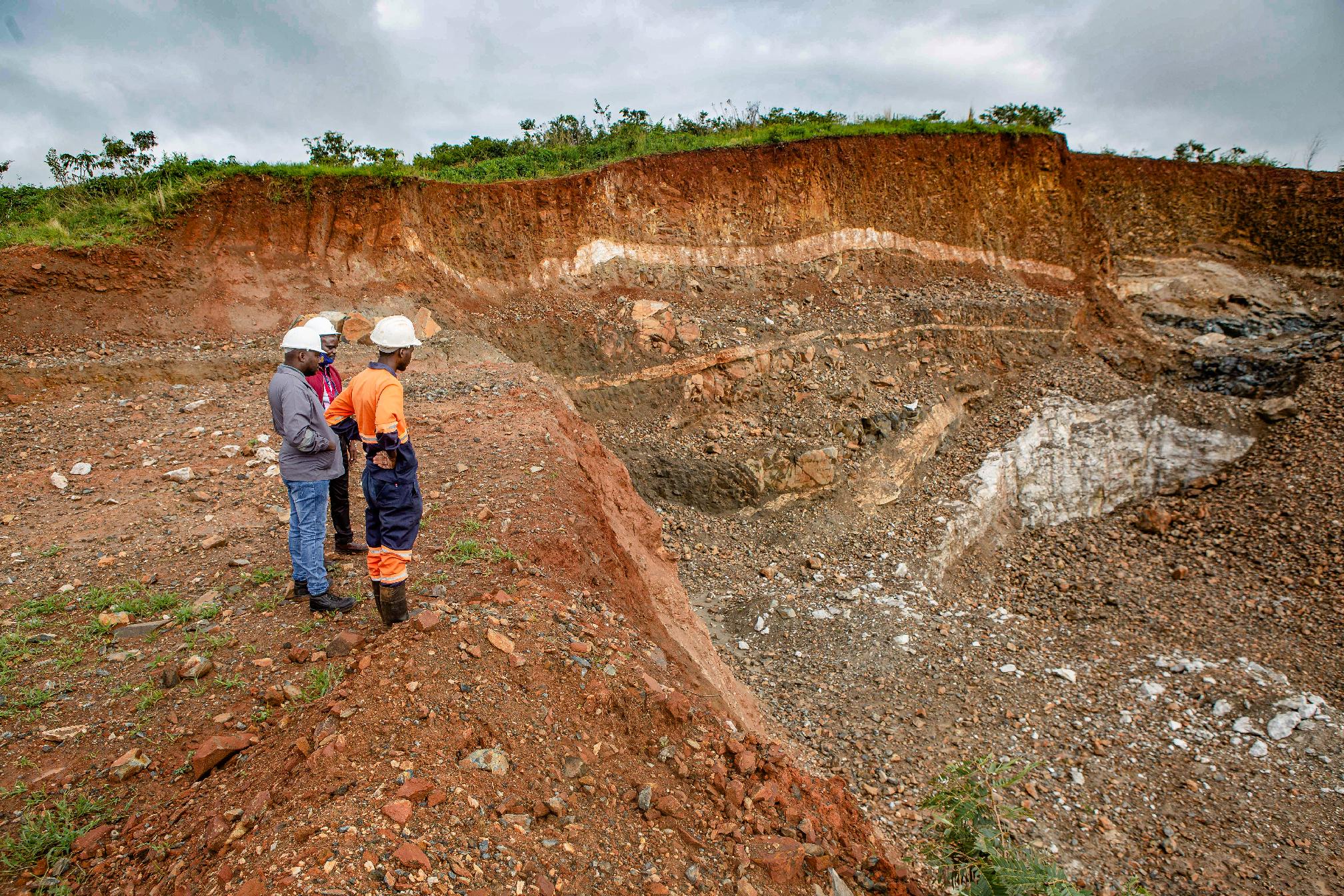
Mineral extraction has made ZANU-PF one of the richest political elites in Africa, while the majority of Zimbabweans live in poverty and endure mass hunger.
“Despite an official ban on unprocessed lithium exports, the politically-connected Sandawana mine appears to have been exempted, trucking thousands of tons of ore out of the country during 2023,” said the Global Witness report.
It added that almost all the lithium ended up being shipped to China.
The judge in Windhoek concluded that Xinfeng had mined lithium by using permits intended for local small-scale miners.
Global Witness said: “This seems to have allowed Xinfeng to start mining a major lithium deposit for as little as US$140, while dodging the need for an environmental impact assessment.”
Namibia’s Minister of Mines, Tom Alweendo, told The Epoch Times: “We’re grateful for our friendship with China and for the confidence it shows by investing in Namibia. But that doesn’t mean we must look away from violations committed by rogue Chinese companies on our territory.”
He added that Xinfeng had exported thousands of tons of raw lithium ore to China, while failing to deliver on repeated promises to construct processing facilities in Namibia.
The country’s government has since prohibited the export of raw lithium.
“We’ve decided to increase domestic processing and take advantage of global demand for metals used in clean energy,” said Mr. Alweendo.
In DRC, the government last year banned six Chinese companies from operating in the South Kivu region for illegally mining gold and other minerals.
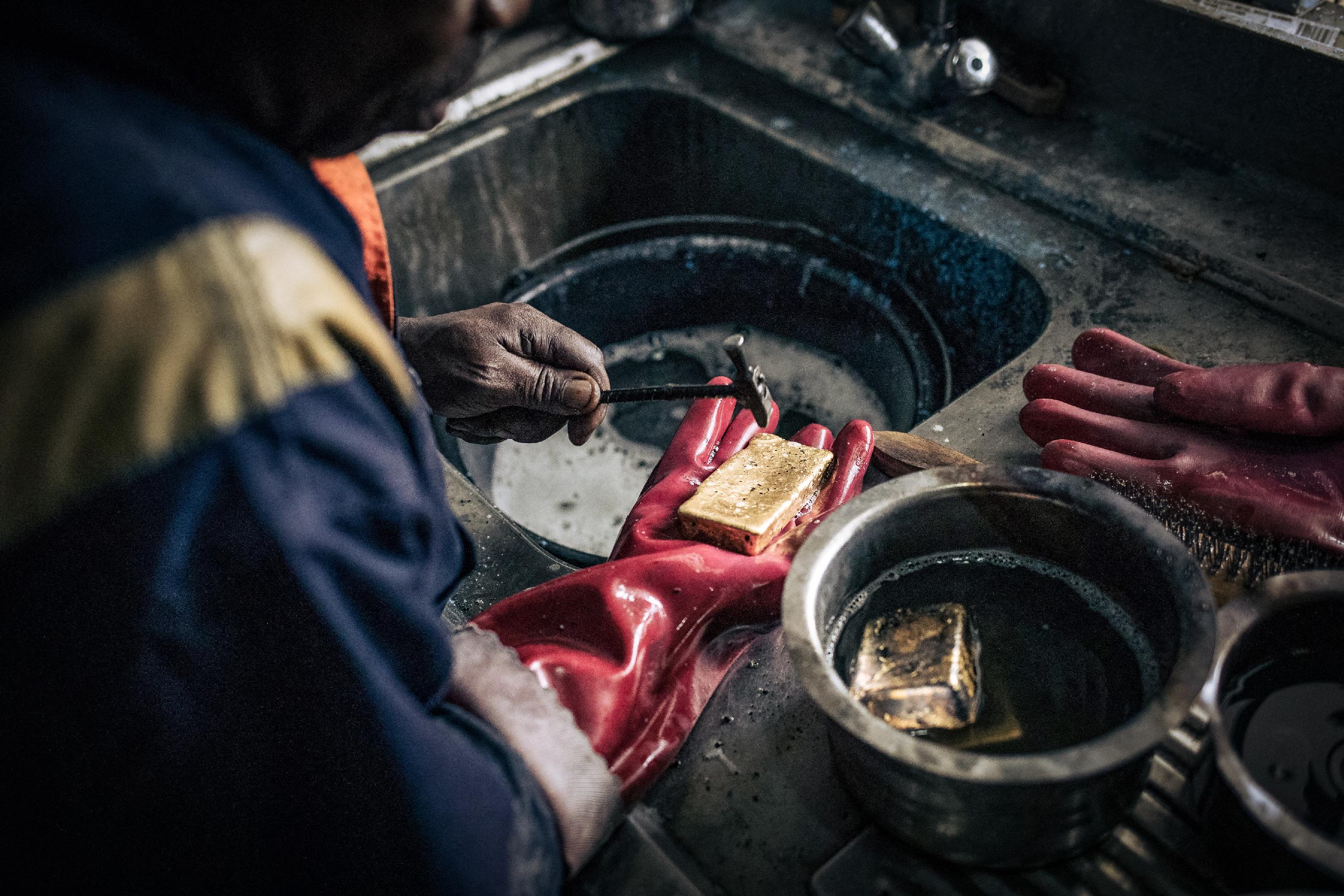
Global Witness linked Chinese companies to several cases of corruption related to lithium mining in Congo.
It mentioned in particular the Manono lithium deposit as raising “numerous corruption red flags.”
Part of the group’s report read: “The project appears to have generated as much as US$28 million for shell companies held by middlemen implicated in previous corruption scandals involving ex-President Joseph Kabila.
“Furthermore, a senior official in current President Felix Tshisekedi’s party reportedly received $1.6 million in ‘commission’ from [China’s] Zijin Mining when it acquired shares in the project.”
“Anti-corruption agents in Congo have told me that the government-owned company that signed the Manono deal sold the rights to mine lithium to the Chinese at a suspiciously low price,” said Ms. Opperman.
She said action against Chinese mineral extraction firms was happening across Africa at an “unprecedented” rate.
But Marcus De Freitas, senior fellow at the Policy Center for the New South, told The Epoch Times abuses by Chinese mining firms were unlikely to deter African governments from forging even closer ties with Beijing.
“The results of Chinese investments in Africa have been much more positive than negative,” said Mr. De Freitas, who’s also a visiting professor of international law and international relations at the China Foreign Affairs University in Beijing.
“All the roads, bridges, economic and trade cooperation zones, railways funded by the Chinese government … that kind of stuff isn’t just wiped out because of the negative actions of a few Chinese mining conglomerates.”
